 By Mark Sanchez
By Mark Sanchez
To prepare for the next 30 years, the West Michigan Whitecaps rst needed to go backward three decades.
By Kate Carlson
New U.S. Census data show immigration contributed to West Michigan’s population growth last year, though community leaders say the region’s housing shortage stands in the way of bigger population gains.
Kent, Ottawa, Allegan, Kalamazoo and Muskegon counties
were among the majority of Michigan counties that experienced population increases last year over 2022, according to new Census data released March 21.
West Michigan’s population growth far outpaced the state’s slight increase of 0.04%, or 3,980 people, last year.
In 2023, Kent County’s population grew by 2,434 people
(0.37%), Ottawa County grew by 2,454 people (0.82%), Allegan County grew by 649 people (0.54%), Muskegon County grew by 1,025 (0.58%), and Kalamazoo County grew by 1,323 (0.51%).
In Kent County, immigration played a key role in growing the
In the early 1990s, after years of trying to bring a minor league baseball team to Grand Rapids, Lew Chamberlin and Denny Baxter formed the Whitecaps organization. Rather than pursue public nancing, as many sports franchises do when developing new venues, the business partners raised the capital they needed from private investors in the Grand Rapids area to build a baseball stadium on a 45-acre site along the Grand River in Comstock Park, minutes north of downtown Grand Rapids. In pursuing upgrades to what’s now known as LMCU Ballpark to sustain the franchise for the next 30 years, West Michigan Whitecaps LLC has returned to its roots.
e Class A Midwest League baseball franchise and Detroit Tigers a liate is raising $35 million from private investors through an equity o ering to pay for upgrades and modernize the 8,500seat LMCU Ballpark.

“When Lew and Denny drew it up, they always wanted this to be a very organic kind of community-centric organization,” said Joe Chamberlin, the second-generation CEO and managing partner for the West Michigan Whitecaps. “Being composed and funded in that way back then ensured that over the last 30 years the community buy-in that we’ve gotten has really been from the ground up. Our ownership group is kind of a demonstration of that.
By Kate Carlson
A metro Detroit developer behind a mixed-use project on Grand Rapids’ north side plans a similar, 150-unit project across the Grand River at the site of a former grocery store on Bridge Street.


Birmingham-based developer Ryan Talbot of Talbot Development is under contract to purchase the vacant Duthler’s Family Foods store, which closed in 2017 at 648 Bridge St. NW.
Talbot is still in the “design and gathering feedback stage,” but plans a 117,000-square-foot, ve-story building with 150 apartments, a small ground oor retail space, tness center, a roof deck for residents, and onsite parking. He hopes to start the $31 million


CRAINSGRANDRAPIDS.COM I APRIL 1, 2024 VOL. 41, NO. 7 l COPYRIGHT 2024 CRAIN COMMUNICATIONS INC. l ALL RIGHTS RESERVED RETAIL Cannabis tax paying for roads, parks and public safety efforts PAGE 3 REAL ESTATE Frank Lloyd Wright Usonian home in Kalamazoo hits market PAGE 4 POLITICS AND POLICY Business leader Goei lls vacant city commission seat PAGE 7 Whitecaps make pitch for $35M capital raise Downtown Grand Rapids. GETTY IMAGES Census data show West Michigan is growing, but it could be better
Developer eyes former Duthler’s site for 150 apartments Ryan Talbot also is building The Current in Creston neighborhood
Baseball team tapping local investors for ‘once-in-a-generation refresh’
CEO and Managing Partner Joe Chamberlin. | MARK SANCHEZ Housing shortage stunts population gains, leaders say Developer Ryan Talbot has proposed a second apartment project in Grand Rapids, this time on the city’s west side. | PINNACLE CONSTRUCTION GROUP See WHITECAPS on Page 23 See DUTHLER’S on Page 25 See CENSUS on Page 25
Whitecaps
Tomorrow is more memories in the making.
Tomorrow is on.SM
Nothing brings people together like a BBQ. That’s why Enbridge is reducing greenhouse gas emissions by blending renewable natural gas and hydrogen into our network. It’s one of the ways we’re fueling family time today, and for years to come.
Learn more at tomorrowison.com

















Rising costs, design setbacks delay Boston Square
plan for 9-acre block is expected to come together later this year
By Rachel Watson and Kate Carlson
A large mixed-use project aiming to serve residents on Grand Rapids’ southeast side is experiencing delays amid higher costs, rising interest rates and design setbacks, though developers are optimistic that the first phase will be accessible to the community later this year.
Amplify GR, a nonprofit financially backed by two DeVos family foundations, has been pursuing
the Boston Square Together project for more than five years. The plan to repurpose an entire 9-acre block is expected to start coming together later this year when a multi-purpose community hub comes online.
The community hub, named “HUB 07” by neighbors of the project, broke ground in April 2023 and is the first major piece of the Boston Square Together project. The 45,000-square-foot hub was originally expected to open in phases starting at the beginning of
this year. The community hub’s three secured tenants at this time are Corewell Health, which is opening a community health clinic on the ground floor, Amplify GR, which plans to move its offices to the building, and IFF, which is working to secure early childhood programming to operate in the space.
The hub’s early learning center will serve 80-100 children ages 6 weeks to 5 years of age and include


Cannabis tax paying for roads, parks and public safety efforts
Municipalities cashing in on $59,086 per license operating in jurisdictions | Kate Carlson
Allowing regulated cannabis businesses is paying off for local governments across Michigan, where excise tax revenue is returning to fund projects such as road improvements and public parks.
The $87.1 million in excise tax revenue generated across the state in 2023 is up about $30 million from 2022, according to information released in February from the state Department of Treasury. Funds are allocated to local governments based on the number of licenses issued in each city, village, township and county. Each community received $59,086 per license operating in their jurisdic-
tion, up from $51,841 per license in 2022.
Hospitality exec leaving for position in native Philippines
AHC’s
George Aquino seizes opportunity to return home
By Rachel Watson
After spending more than three decades in leadership roles at AHC Hospitality, one of the company’s top executives has resigned to accept a new challenge in his home country.
George Aquino, vice president and managing director of Grand Rapids-based AHC Hospitality, resigned his position last month and will be leaving the company on April 17 to pursue a career opportunity in the Republic of the Philippines.
Aquino’s new role will be as president and CEO of Ayala Land Hotels and Resorts Corp.

Local government leaders across West Michigan say they plan to allocate the money toward a range of projects such as street and park improvements or bolstering their general fund.
2023 fiscal year, which ended Sept. 30. The nearly $475,000 in tax revenue coming back will support local street improvements.
The $87.1 million in excise tax revenue generated across the state in 2023 is up about $30 million from 2022.
The city of Lowell had eight licensed businesses during the
“The last several years since we’ve started receiving this (excise tax revenue) is the most aggressive the city has been on improving streets in 50 years,” said Lowell City Manager Mike Burns. “Right now we’re planning over $1 million in improvements to address (street) concerns, in large part due to the cannabis excise tax.”
Officials in Cedar Springs,
which has six licenses in the northern Kent County town of about 3,600 people, considered using its $354,518 in cannabis tax revenue on road improvements. The city had a general fund budget of about $1.8 million in fiscal year 2021. This year’s cannabis tax revenue instead will be used for local match requirements on grants for several park projects. Those grant-funded projects include a playground and creating a pocket park in the city’s downtown.
“We could pave one block with a
The metro Manila-based, family-owned company is “very similar” to the DeVosand Van Andel-owned AHC, he said.
AHC President Rick Winn announced Aquino’s departure in a letter provided to Crain’s Grand Rapids Business.
Winn said in an interview that Aquino is “a big piece of a puzzle that’s been working for the past 30 years” at AHC. Working as partners, together they grew the company’s management portfolio from four hotels to 13 and expanded AHC’s food and beverage portfolio to 30 restaurants and bars.
“We’re not just losing someone in our business. We’re losing a
April 1, 2024 | CrAiN’S GrAND rApiDS BUSiNESS | 3
the
phase of Boston Square Together that’s expected to break ground in the next few months. | COUrTESY OF AMpliFY Gr
Renderings
of
“F2”
growing in one of Common Citizen’s 14,000-square-foot grow rooms in Marshall. | DUSTiN WAlSH/ CrAiN’S DETrOiT BUS NESS
Marijuana
See CANNABIS on Page 25
on Page 24
See BOSTON SQ.
See AQUINO on Page 24
Aquino
Frank Lloyd Wright Usonian home in Parkwyn Village hits market
By Rachel Watson
One of the four Frank Lloyd Wright-designed homes in Kalamazoo is on the market in a deal that includes original furnishings and blueprints.
Seller David Gunther Wood, of Texas, listed his home in the Parkwyn Village community of Kalamazoo’s Winchell neighborhood on March 6 for $790,000.
Realtors Fred Taber, of Jaqua Realtors in Portage, and Victoria Krause Schutte, of @properties Christie’s International Real Estate in Oak Park, Ill., have the listing.
The four-bedroom, two-bathroom dwelling was completed in 1951 and is called the McCartney House after the original owners, Ward and Helen McCartney, who hired Wright to design it.
It comprises 1,671 square feet on an approximately 1-acre wooded lot. The house itself has an unusual shape consisting of intersecting triangles, a layout Wright referred to as “experimental” when presenting the plans to the McCartneys, according to writings by Helen McCartney published by the Frank Lloyd Wright Foundation.
Wood, who previously owned and restored another Wright home, said he and his partner are selling it because they were not able to devote as much attention to upkeep
four in Galesburg in The Acres community and four in Kalamazoo’s Parkwyn Village.
Usonia is a moniker derived from the phrase “United States of North America” and was Wright’s preferred term for America, according to a book of reflections he published later in life. Usonian homes were Wright’s attempt to produce attractive, low-cost homes that most middle-class Americans could afford.
The resulting designs, only 60 of which were ever built, featured single-story structures with low-peaked or flat roofs, cantilevered carports, built-in shelves and cabinetry, tall windows to let in sunlight, radiant heat embedded in the floors, and a central hearth.
A group of idealistic Upjohn scientists pitched a plan to Wright in 1946-47 to design a cooperative community of Usonian homes with jointly owned amenities and infrastructure. The group ultimately splintered into two factions — families who wanted to live in Galesburg and those who preferred Kalamazoo. Each group bought acreage, and Wright helped develop the plan for the neighborhoods. He was in his 80s at the time.
Although Wright designed eight homes, many elements of the subdivisions never came to fruition. In Galesburg, a fifth home was added by Wright’s student Francis Willsey, and in Kalamazoo, other homes by different designers sprang up to complete the neighborhood.
The four-bedroom, twobathroom dwelling was completed in 1951 and is called the McCartney House after the original owners, Ward and Helen McCartney, who hired Wright to design it.
as the property deserves.
“By not being there more than a week or two a year, it’s not fair to the house,” he said. “Being the owner of a Frank Lloyd Wright house, or any significant architecturally designed house, there is constant work that needs to be done to keep the driveways clean, the sidewalks clean, leaves off the roof … because you want the house to always look pristine. You never want defects in the house to develop over time because you’re not going to be there for another nine months.”
History of the property
The home is one of eight Wright-designed, Usonian-style houses in Kalamazoo County —


are larger with more acreage, Taber said.
“This (McCartney) home is smaller and has not been restored to the level that the Eppstein and Pratt have, either. Plus, the location is different,” Taber said.
Added Krause Schutte: “The Acres is more rural, and there just aren’t as many people going through it.”
The brokers said although they’ve hosted some showings — including for a docent at the Wright-designed Meyer May House in Grand Rapids — as of mid-March they had not yet received any written offers on the McCartney House.
About the price
Taber, one of the real estate agents for this listing, said there are two schools of thought for pricing Usonian homes. Some people feel the list prices should factor in the historical value and connection to a famous architect like Wright, while others think that the homes should be kept affordable for middle-class buyers in perpetuity.
“Their mentality is that, ‘Oh, those homes were never meant to be expensive,’ and it’s just odd to see that mindset,” given inflation and the historical value of the properties, Taber said.
He and Krause Schutte said they tried to strike a balance, basing the list price for the property on its relative size compared to other Usonian homes, as well as acreage, setting and condition.
The other two Wright homes on the market in Galesburg, the Eppstein and Pratt homes that are part of The Acres, are priced at $4.5 million for the pair because they
Updating the house
Property records show Helen McCartney, who died in 2008, lived in the home for 54 years until 2005, and it has had five subsequent owners.
The Meyers family who acquired it in 2012 began the restoration process using the home’s original blueprints, and the next owner, Timothy Nakasawa, continued the work.
Wood and his partner bought the house in November 2021 for $425,000. They then invested thousands of dollars into additional restoration projects, including repairing and re-staining the exterior concrete blocks; restoring a 20-foot section of the exterior screens, windows and doors to match the original blueprints; and installing a new hot water boiler system for the furnace and radiant heating. They also added a security system that will be included in the sale.
“The new owner will just need to get a subscription with the local security monitoring company, but the hardware itself stays,” Wood said.
Wood also built triangle-shaped


furniture for the home that matches designs provided in the original blueprints.
The blueprints, along with all of the original built-ins, a pair of watercolor paintings by Helen McCartney, the beds, sheets and towels, and the furniture Wood built, are included in the listing.
“The original (triangle tables flanking the concrete wall) in the dining room, they are the originals to the house. Some of the other ones that are the smaller tables, like the end tables, coffee tables for the sofa and freestanding table in the dining room, those I built and brought up there from Texas,” Wood said. “I learned a lot, followed the blueprints and cut them to the exact dimensions and angles that were in the blueprint.”
Standout features
During his ownership, Wood said he grew to appreciate the neighborhood surrounding the home.
Last October, he was asked to host a local Boy Scout troop fundraiser, which was the only time he opened the home to the public.
“I worked with a docent, and the docent and I gave everyone tours of the house and gave them a little bit (of) the history,” he said.
Wood said he also appreciated the home’s private setting tucked away in a far corner of the subdivision, with the entire backside of the home facing the Asylum Lake Preserve. Because there are so many windows, it’s easy to see wildlife and feel part of nature, he said.
“It’s a very pristine area to live in, either full time or part time,” he said. “It gives you the convenience of being close to the city and the services, but it also gives you the seclusion.”
“The biggest advantage is the neighbors,” he said. “They’re all very friendly, very easy to work with. I’m not the most social person in the world, and so it’s nice to be able to be in Michigan and talk with the neighbors, walk the dog together — stuff like that.”
4 | CRAIN’S GRAND RAPIDS BUSINESS | APRIl 1, 2024
This Usonian-style home designed by Frank Lloyd Wright in Kalamazoo’s Parkwyn Village listed for just less than $800,000 last month. | MATTHEW TRUMAN

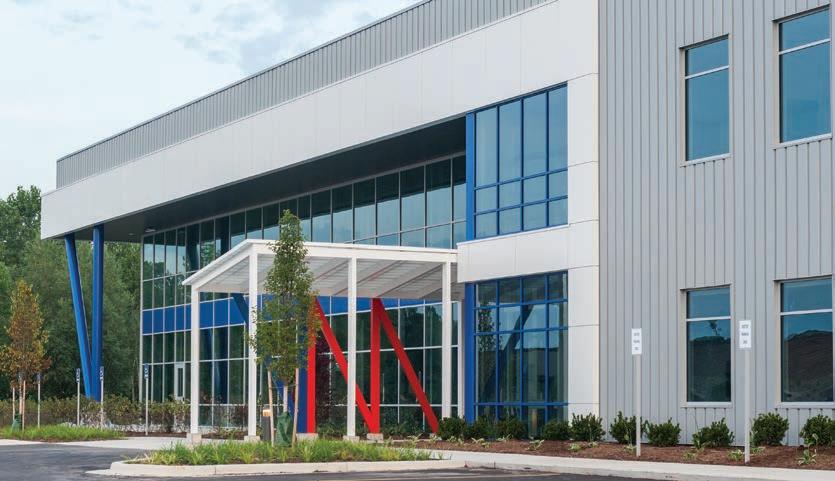

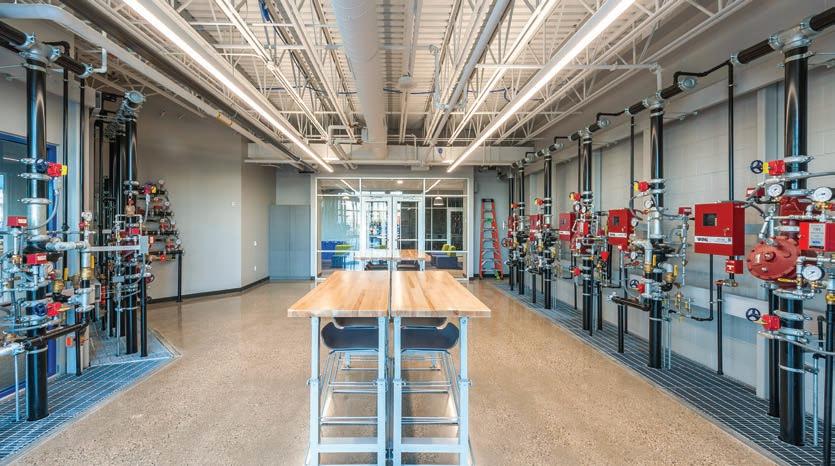
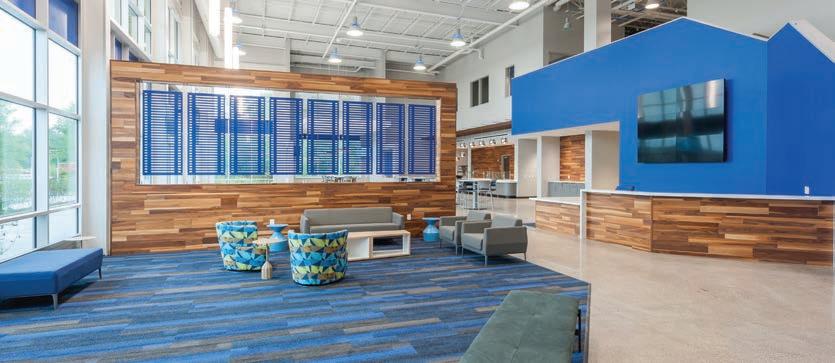


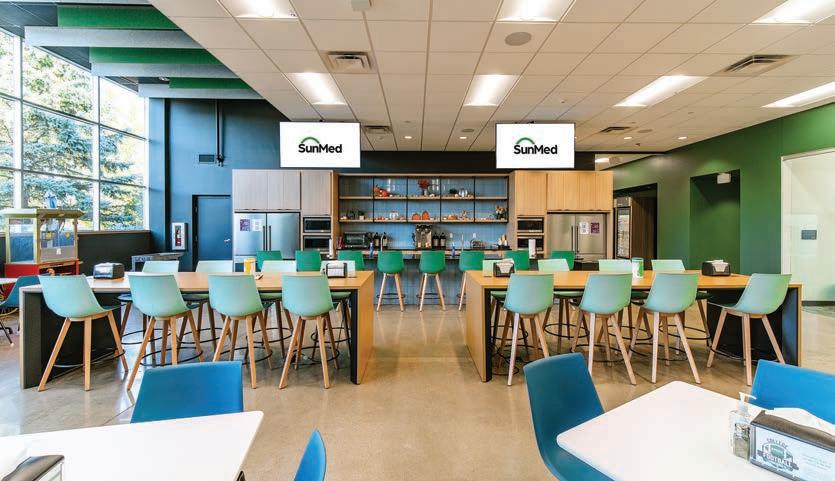





Orion Construction starts on 274-unit townhomes project
By Rachel Watson
A local construction firm has started building the first few units in a two-phase townhomes project that calls for a total of 274 market-rate rental and for-sale housing units when completed.
Grand Rapids-based Orion Construction on March 15 began building the first phase of a long-planned townhomes project at 1184 60th St. SE in Gaines Township.
First proposed in 2021, the project was previously called Ashford Woods and recently was renamed Eden Forest to avoid confusion with Ashton Woods apartments in Kentwood.
Gaines Township in July 2023 approved a rezoning and site plan for the first phase of the project, which will include 152 rental townhomes. Orion began site and infrastructure work in January.
Orion is the construction manager working on behalf of an undisclosed out-of-state developer doing business as 60th Street Ventures LLC, which is registered to Orion CEO Roger Rehkopf. The developer bought the approximately 40-acre parcel from Kentwood Community Church last September for $1.8 million, according to township property records.
Walsh said this area is perfect for housing, with its proximity to a Meijer, Tanger Outlets, M-6 and I-196, the Gerald R. Ford International Airport, and a variety of other shopping, dining and entertainment options.
“We felt that this area … was a slam dunk,” he said. “It seemed like things aligned, and it was a very, very good opportunity.”
The engineer for the development is Grand Rapids-based Moore and Bruggink Inc., and the architect is Create3 Architecture, also based in Grand Rapids. Rockford-based Redstone Property Management will oversee leasing.
The first phase of the project will include 10 six-unit townhome buildings and 23 four-unit buildings, for a total of 152 townhouses.
Eighty-six of the units will have two bedrooms, and the remaining 66 will have three beds.
According to township meeting minutes from last July, rents are expected to range from $2,100 to $2,700 per month, though Walsh said last month that final ranges have not been determined.
Each unit will have a garage in
Orion President Brad Walsh said the church was looking to offload the acreage to pay for an expansion of its onsite child care facility, a project Orion completed and cut the ribbon on last month.


the back and a small porch and yard in the front. The development will include 436 parking spaces between garages and driveways.
The development is sited around forested wetlands that will be preserved and will include nature trails and open space, with detention basins in the low areas adjacent to the wetlands to help control runoff.
There also will be a playground, gazebo and half-court basketball area.
Phase one construction is expected to wrap in mid-2025.
A future phase that would need additional township approval tentatively calls for a mix of rental and for-sale housing totaling another 122 units, Walsh said.
He said the two phases would connect seamlessly.
“One of the main components that we kept on talking to Gaines
WINNERS

 By Kate Carlson
By Kate Carlson
The Grand Rapids City Commission unanimously approved $80.5 million in capital improvement bonds for the Acrisure Amphitheater project.

Part of the bond, in the amount of $60 million, will go toward construction, renovation and remediation costs at 1500 Scribner Ave. NW, the former Kent County Road Commission property where the city is moving various services to clear the way for the amphitheater at 201 Market Ave. SW. The other $20.5 million of the bond will go toward constructing the $184 million amphitheater.
The city commission approved the bond resolution March 19.

Debt service payments for the $20.5 million of the bonds will be reimbursed to the city by the Downtown Development Authority. The DDA approved the reimbursement agreement to contribute payments over the next 20 years at its Feb. 14 meeting. The $184 million amphitheater project being developed by Grand Action 2.0 is expected to break ground in May.
Semi-annual debt service pay-
Crain’s Grand Rapids Business launches paywall
Township about, and the church for that matter, was having a walkable community,” Walsh said. “So the nature trail will connect the two different phases, and we have sidewalks throughout, so those roads will continue into the next phase, as well.”
Dan Wells, community development director for Gaines Township, said the project came about as the township adopted and started implementing its new master plan, which guides conversations around housing density.
But he said the township still is working to update its zoning ordinance, so the rezoning process for Eden Forest was more complicated than expected. They ultimately forged an agreement with the developer for a conditional R-3 zoning, which allows medium density uses, like townhomes, but would prevent the developer from building apartments in future phases.
When Crain’s Grand Rapids Business launched last year, the mission was to create the top source of business news, analysis and information in the region. One year in, we’re proud that we’ve become required reading for leaders throughout the business community in West Michigan and look forward to delivering on that mission for years to come.
Producing quality journalism like Crain’s takes time, care and resources, so beginning April 2 much of crainsgrandrapids.com will require a subscription.
Become a subscriber now for:
w Unrivaled coverage of the industries driving West Michigan’s economy
w Exclusive breaking news
w 40 Under 40, the Grand Rapids 200 and other roundups of the names you need to know
w Full access to our online archives
w Every-other-week print delivery to your home or office
Existing print subscribers simply need to create an account online; there is no additional charge for access to crainsgrandrapids.com.

ments for the new city facility being built on Scribner will be sourced from the city’s capital reserve fund, as well as from streets, refuse, fleet and other departments that will be housed at the future facility.
The city of Grand Rapids has not given direct funds to the amphitheater project, but has taken on projects and shared costs to clear the site for redevelopment, including relocating the trunk sewer that used to run under the site.
As well, the city is now in the process of temporarily relocating ser-
vices off the 201 Market site and preparing to construct its new facility at Scribner.
The city purchased the site for $7.45 million last year.
Bergmann Associates Inc. and Clark Construction Co. are designing and will soon complete pre-construction services at the Scribner property.
In March, contractors started pulling demolition and building permits at the Scribner property. Plans call for removing two pole barns and a concrete salt dome, according to permits filed with the city.
The renovation and new construction spanning several buildings at Scribner is estimated to cost more than $61.8 million, according to the building permit application. The anticipated project costs ballooned from earlier estimates based on rising material and construction costs, MLive reported earlier this year.
6 | CRAIN’S GRAND RAPIDS BUSINESS | APRIl 1, 2024
Executive Challenge
Kirk Gates
Katie Sara in
Amy Ayotte
Ben Brouwer
!
Emerging ea ers Challenge WINNER :
Renderings for the proposed Acrisure Amphitheater in downtown Grand Rapids. | COURTESY OF PROGRESSIVE AE
Orion Construction began site and infrastructure work in January and started building the first units of Eden Forest last month. | COURTESY OF ORION CONSTRUCTION
City to issue $80.5M in bonds for amphitheater, relocation
Business leader Goei fills vacant city commission seat
By Kate Carlson
Bing Goei, a leader in West Michigan’s business community and the owner of Eastern Floral and the Goei Center, was appointed to fill a vacancy on the Grand Rapids City Commission for a term that expires on Dec. 31.
Goei, 75, fills out the term of former Third Ward Commissioner Nathaniel Moody, who resigned at the end of 2023 for personal reasons.
Goei becomes Grand Rapids’ first Asian American to serve on the city commission. Goei said during his interview process with the city that he does not plan to run for the Third Ward seat after his term expires.
Goei will represent the city’s Third Ward, which spans the city’s southeast side roughly east of Jefferson Avenue and south of Wealthy Street, alongside Commissioner Kelsey Perdue.
In 2014, Goei was appointed the first director of the Michigan Office for New Americans by former Gov. Rick Snyder, in an effort to attract international talent to grow Michigan’s economy. In 2022, Goei received the Hillman-Orr Award from the World Affairs Council of Western Michigan for bringing global awareness and international understanding to the region.
Goei has maintained that Grand Rapids must recruit new talent, including from Black and brown communities, to remain competitive.
“For Grand Rapids to maintain its competitive edge, Grand Rapids
must create the necessary environment which will encourage nonwhite talent to choose Grand Rapids,” Goei said.
The city selected Goei from six Third Ward applicants, which were then narrowed down to three finalists who were interviewed by the city commission during a public meeting on March 5. The other two finalists were Marshall Kilgore and John Krajewski.
Of the three finalists, Goei was alone in telling commissioners he does not plan to run when the seat expires at the end of 2024.
Perdue was encouraged by this

because of how time-consuming running for a city commissioner seat can be, she said during a Com-
mittee of the Whole meeting ahead of the formal March 19 vote.
“I’m encouraged because he’ll be able to focus and bring commitment to this role as well as a very diverse background and network to serve in this role,” Perdue said.
Second Ward Commissioner Milinda Ysasi supported Goei’s appointment based on his experience working with organizations at the state level, and his background as a longtime business owner in the community.
Goei’s appointment will help the city in “ensuring positive economic development,” Ysasi said.
FEATURED LISTING
“For Grand Rapids to maintain its competitive edge, Grand Rapids must create the necessary environment which will encourage nonwhite talent to choose Grand Rapids.”
Bing Goei, Third Ward City Commissioner
Goei fled Jakarta, Indonesia, with his family in 1960 and has been living in Grand Rapids for 64 years. Goei started his floral business out of his garage with funding from friends when he was denied a business loan by a bank, he stated in his city commissioner application.
Goei said he plans to focus on supporting and growing the city’s small businesses and reducing poverty across the city, particularly in the Third Ward.
“As a commissioner for the Third Ward, I appreciate the fact that the city has made intentional efforts to bring resources to us,” Goei said in his application. “But much more must be done to overcome the lack of investments experienced by residents in previous years. I am confident that we will be able to do so and to do so with a sense of urgency.”
Goei is a giant in West Michigan’s Asian business community. Through his work at the West Michigan Asian American Association, Goei was instrumental in securing funding from Kent County at the height of the COVID-19 pandemic to help Asian-owned businesses apply for pandemic relief grants. He continued to advocate for Asian- and other minority-owned businesses throughout the pandemic through various business organizations he’s been involved in, which currently include the West Michigan Asian American Association and the Amplify GR board.



248.703.9609
CRAINHOMES@CRAIN.COM
320 Martin
BAY HARBOR, MI
3 BEDROOMS | 3.1 BATHS | 2,700 SQ. FT.
Make your dream a reality with this stunning Cape Cod style condo, right on the harbor with unbelievable lake front views on three sides including two balconies and plenty of amenities. This stunning condo is a fully managed investment opportunity with significant rental income. Boasting 3 bedrooms, 3.1 bathrooms, and 1.5 car garage spaces, this spacious 2,700 sq.ft turnkey, fully furnished, condo is ready to move in. With a full gym, 24-hour building security, housekeeping option, with amenities of Bay Harbor, swim club, the marina, and boating facilities. Step outside to the quaint shopping district lined with boutiques and cafes, or stroll to the waters edge and enjoy dinner at The Knot. You do not want to miss this incredible opportunity to view the sunsets over the harbor or take your boat out of the Marina and enjoy a day on the beautiful Lake Michigan.
TO LEARN MORE, SCAN OR VISIT CRAIN-HOMES.COM

April 1, 2024 | CrAiN’S GrAND rApiDS BUSiNESS | 7
Bing Goei during the Third Ward interview process. | C TY OF GrAND rApiDS
Street, Suite
Birmingham, MI
200
48009
What’s on tap for the bar scene this summer
By Abby Poirier
While hospitality businesses bore the brunt of the disruptions during the pandemic, bars and other drinking establishments also emerged with new tools to serve patrons and bolster their operations going forward.
In particular, the creation of social districts came as one unexpected silver lining from the pandemic.
Answering the call of bars and restaurants that were looking for a lifeline during the early days of the public health emergency when indoor dining closed, Gov. Gretchen Whitmer signed legislation on July 1, 2020, allowing the creation of temporary social districts. The law was made permanent under a bill enacted last year.
COMING SOON
Motu Lakeshore
Two drinking establishments, Motu Lakeshore Wine Bar and Prohibition Muskegon Bar & Lounge, are currently underway at 1208 8th St. in Muskegon. The bars are owned by Jonathan Jelks and his father, Randal Jelks; Jamiel Robinson; recording artist Willie “Willie the Kid” Jackson; and Alvin Hills IV. The establishments kicked off construction in 2022, but have yet to set an official open date, although Motu Lakeshore has started recruiting for employees. The two separate bars will share the same building, with Motu Lakeshore taking the front of the building and Prohibition Muskegon, with a full-service bar and lounge, located in the back of the facility. The Muskegon establishments, which will offer a minimal food menu of small plates and charcuterie to start, will work together to host weddings, receptions and other formal, large events.
New Holland Brewing
In early March, New Holland Brewing detailed plans for a new 1,300-square-foot spirits tasting room in Grand Haven, joining its lakeshore tasting rooms in Saugatuck and South Haven and its flagship location in Holland. The tasting room will be built-out in the lobby of the former Grand Theatre at 24 S. Washington Ave. and will seat 40 guests. The location will serve cocktails made with New Holland’s spirits at the bar and to-go window. The company anticipates opening the tasting by Memorial Day.
Muskegon Brewing Co.
Adelaide Pointe developer Dr. Emily Leestma is bringing back Muskegon Brewing Co., signing a deal with Muskegon-based Pigeon Hill Brewing Co. to brew for the new restaurant and bar, which is slated to open on Muskegon Lake in June. This summer, the name will be revived with a range of classic and modern styles, including a lager, blonde ale, west coast IPA, hazy IPA, saison, fruit beer and wheat beer, all of which will be made by Pigeon Hill and marketed under the Muskegon Brewing Co. brand. When the restaurant and bar opens near the west end of West Western Avenue, Muskegon Brewing Co. will seat 250 people and offer a view of Muskegon Lake. The focal point of the restaurant will be its 42-seat curved bar that extends between the 5,500-square-foot restaurant and the 2,700-square-foot patio.
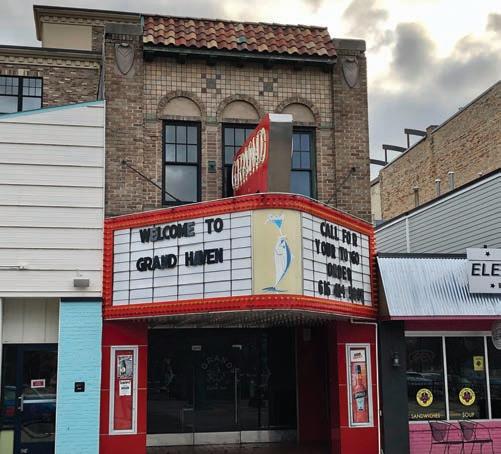
“(Social districts) helped us survive and helped us change our model in the state of Michigan,” said Scott Ellis, executive director of the Michigan Licensed Beverage Association, the trade group for liquor license holders in the state.
The MLBA had been pushing the state to allow a similar concept in the years before the pandemic without any traction, according to Ellis.
Social districts, which now allow patrons to enjoy drinks outdoors within the limits of an established common area, now have become a normal part of the bar-going experience for many customers. Like carry-out alcoholic beverages, the addition of social districts changed how bars and patrons interact, giving drinking establishments more
RECENT OPENINGS
Chateau Grand Rapids
A new upscale coffee shop and winery dubbed Chateau Grand Rapids, located at 955 Cherry St. SE in Grand Rapids’ East Hills neighborhood, opened on Jan. 25. The 1,000-square-foot bar seats 50 guests. Run by husbandand-wife duo Chris and Allaire Swart, Chateau Grand Rapids offers coffee from Brooklyn, N.Y.-based small-batch roaster SEY Coffee by day and transitions into a loungestyle wine bar at night with small plates and an extensive wine list.
Eastern Kille Distillery
On Dec. 22, Eastern Kille Distillery opened its new $4.2 million distillery and restaurant at 7755 Childsdale Ave. NE in Plainfield Township, near Rockford. The new location, which is adjacent to White Pine Trail, boasts an 8,000-square-foot distillery, 4,000-square-foot dining room and an outdoor cocktail garden on 16 acres. The restaurant serves cocktails made with Eastern Kille’s spirits, but eventually, the company plans to apply for additional licenses to serve a range of wine, beers and ciders.
Mammoth Distilling
Mammoth Distilling moved into the Grand Rapids market in early November, opening a 2,500-square-foot tasting room at 710 Wealthy St. SE. The new location marks the company’s entry into West Michigan and the distillery’s sixth tasting room, in addition to locations in Traverse City, Bellaire, Bay Harbor, Adrian and the company’s flagship tasting room and production facility in Central Lake. The Wealthy Street tasting room seats a total of 150 guests and offers Mammoth’s fruit-infused range of vodkas plus gin, whiskey, bourbon and cordials. It also features wine tastings from Traverse City-based Bonobo Winery.
Fox and Hen Winery
Wil Malski opened Fox and Hen Winery in early October at 13373 104th Ave. in Ottawa County’s Robinson Township, where he offers guests an authentic, stripped down approach to wine tasting. The winery’s 3,200-square-foot tasting room is located on 6.5 acres and is set in a vineyard Malski planted. Fox and Hen offers sparkling or still white and red wines and cider. The tasting room seats 40 customers.
Saugatuck Brewing in Kalamazoo
After a 10-month hiatus for a relocation project, Saugatuck Brewing reopened last April in downtown Kalamazoo at 200 E. Michigan Ave., the former site of Olde Peninsula Brewpub and Restaurant. The brewery moved from 140 S. Westnedge Ave. after closing its doors at that location in June 2022. The taproom has seating for 169 people and serves a range of Saugatuck Brewing’s beer and cider, including Olde Peninsula Porter, a wine list and a cocktail and spirits menu
.
Mo’s Cocktail Lounge
Last fall, the Gilmore Collection resurrected Mangiamo as an upscale, vintage Italian restaurant at 1033 Lake Drive SE. With it, the restaurant operator also created a new bar on the premises, dubbed Mo’s Cocktail Lounge, located in the former wine cellar of the restaurant. The lounge is hosted by Morgan Gilmore, daughter of Gilmore Collection CEO Gregory Gilmore. She is using the small, 35-seat lounge to connect the company with a younger clientele in a classic, speakeasy-style atmosphere. The lounge has a separate entrance and a small sharing menu for guests to grab a drink before or after dinner at Mangiamo.
sales opportunities and helping them bounce back post-pandemic, Ellis said.
“There’s no doubt, it’s been a success,” he said. “Our members love (social districts). I don’t want to say it was the biggest boon for the industry ever, but it’s definitely been helpful, with no repercussions at all.”
Ellis noted that heading into 2024, Michigan’s bars continue to rebound, with more establishments opening and expanding despite labor and inflationary pressures.
That’s certainly proved to be true in West Michigan, where newly opened and upcoming bars and taprooms outweighed closures in 2023. Here’s a look at the region’s changing bar scene and a round-up of what’s coming in the months ahead.
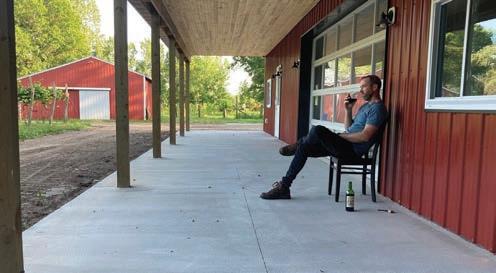

CLOSED
Guardian Brewing
The 12,000-square-foot Guardian Brewing Co. brewery and restaurant closed permanently on St. Patrick’s Day. Owners Kim Collins and Kate Bishop announced the closure so they could be with family after a family member’s cancer diagnosis earlier in the year. The LGBTQ-owned brewery, located at 3657 63rd St. in Saugatuck, made a splash when it opened in 2018, offering a full food menu, wine, hard cider, alcoholic and nonalcoholic cocktails and a variety of beer made on-site. Guardian Brewing distributed its beers to 33 retailers across the state.
Broad Leaf West Side
Broad Leaf Brewery and Spirits closed its west side Grand Rapids location at 443 Bridge St. NW on Jan. 13, citing a lack of business to sustain the taproom and restaurant. The location, which served pub fare and cocktails alongside Broad Leaf’s signature brews, opened in 2022. It was Broad Leaf’s second location in the Grand Rapids area, and had recently rebranded with a retro arcade theme a month before the closure. Broad Leaf Brewery and Spirits’ flagship location at 2885 Lake Eastbrook Blvd. SE in Kentwood remains open.
Grand Rapids Brewing Co.
On Feb. 23, fire broke out at 1 Ionia Ave. SW in downtown Grand Rapids, home to an office suite and Grand Rapids Brewing Co., located on the ground floor. The fire started in a fryer in the basement kitchen and traveled up the building through the exterior HVAC system and burned the roof in several places, as WOOD TV8 reported at the time. No one was injured in the incident. The brewery has not reopened following the fire. Signs on the door and windows of the brewery noted the company was “closed for repairs.” A spokesperson for owner Project Barfly told Crain’s Grand Rapids Business that as of March 25, the company had yet to finalize decisions on next steps for the brewpub.
8 | CRAIN’S GRAND RAPIDS BUSINESS | APRIl 1, 2024
The lobby of the former Grand Theatre at 24 S. Washington Ave. in Grand Haven will become the next spirits tasting room location for Holland-based New Holland Brewing Co. MARK SANCHEZ.
Fox and Hen Winery includes a 3,200 square-foot tasting room. | COURTESY OF WIl MAlSKI, FOX AND HEN WINERY
Mammoth Distilling’s 2,500-square-foot tasting room at 710 Wealthy St. in Grand Rapids. ABBY POIRIER
CRAIN’S DINING AND ENTERTAINMENT GUIDE
Options for vibrant culture, delectable cuisine and unforgettable entertainment.
APPLAUSE CATERING + EVENTS
3755 Broadmoor Ave. SE, Suite C, Grand Rapids, MI 49512 • 616-940-0001 applause-catering.net
Applause Catering + Events, awarded Best Caterer nine times by Grand Rapids Magazine, offers comprehensive services for weddings, corporate events, and more. Our experienced team ensures every detail is perfect, from custom menus to event design. Partnering with West Michigan’s exclusive venues, we guarantee a memorable, tailormade experience. Call us at 616-940-0001 for your event needs. Founded in 1989.
MICHIGAN MARITIME MUSEUM
260 Dyckman Ave., South Haven, MI 49090 269-637-8078 • MichiganMaritimeMuseum.org
The Michigan Maritime Museum is your premier year-round waterfront entertainment, education and event destination in West Michigan. Be it a sailing cruise, museum tour or group gathering, your experience is sure to be first-class. The museum campus boasts multiple waterfront indoor and outdoor spaces giving you the opportunity to select the perfect venue for groups from 5 to 500 attendees.
REDWATER RESTAURANTS
5500 Cascade Rd. SE, Grand Rapids, MI 49546 616-949-0570
• redwaterrestaurants.com
Elevate your taste at RedWater Restaurants! With ten unique concepts from Grand Rapids to the Lakeshore, RedWater prides themselves on their exquisite ingredients and exceptional service. Enjoy sophisticated yet approachable meals in contemporary settings, paired with some of the best views in West Michigan. Lunch, dinner or a special occasion, RedWater provides every guest with an unforgettable
TWO SCOTTS BARBECUE
536 Leonard St. NW, Grand Rapids, MI 49504 616-608-6756
twoscottsbbq.com
Two Scotts Barbecue offers authentic barbecue, smoked in-house daily with homemade sides and sauces. The old rootbeer stand also features draft sodas and weekly specials! E-mail us at info@ twoscottsbbq.com for catering availability.

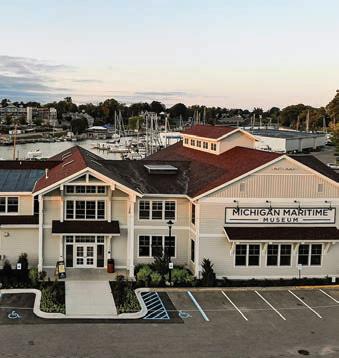


THE LOCAL EPICUREAN
1440 Wealthy St. SE, Grand Rapids, MI 49506 616-206-5175 • thelocalepicurean.com
The Local Epicurean is a cooking school and artisanal food market located in Grand Rapids, Michigan. Designed for groups of two to 48, they offer over a dozen menus featuring freshly made pasta and classic Italian dishes in a hands-on cooking class style. The menu and experience are tailored to each individual group and led by an expert culinary instructor.
REDWATER EVENTS
5500 Cascade Rd. SE, Grand Rapids, MI 49546 616-264-6818
redwaterevents.com
RedWater Events features nine stunning venues across West Michigan, perfect for weddings, business events and social occasions of all sizes. Revel in beautiful event spaces with picturesque views. Indulge in delectable food and beverage catering, accompanied by unparalleled service from a dedicated team of professionals. From intimate affairs to grand celebrations, RedWater specializes in creating unforgettable experiences tailored to your needs.
SHKODÉ CHOPHOUSE
1123 129th Ave., Wayland, MI 49348 269-792-7777
gunlakecasino.com/dining/shkode-chophouse
The finest flame-grilled steaks, chops and seafood sizzle with perfection at Shkodé, where you can indulge in an array of succulent entrees complemented by craft cocktails, curated wine list and whiskeys from around the world. It’s just one of the five tantalizing dining options here at Gun Lake Casino.

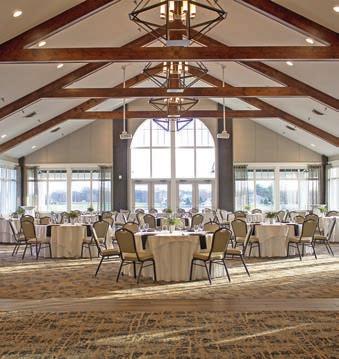

This guide showcases a variety of restaurants, bars, private spaces and entertainment venues all while highlighting new menus, chefs and upcoming special events. Reserve your spot now by contacting Jill May at jill.may@crain.com.
SPONSORED CONTENT
Macatawa Golf Club
Photo: Ashley Wierenga
MICHIGAN WOMAN-OWNED BUSINESSES
1
2
3
4
5
6
7
8
9
10
10 | CRAIN’S GRAND RAPIDS BUSINESS | APRIL 1, 2024 Company Address Phone; website Majority owner(s) Revenue ($000,000) 2023/2022 Percent change Michigan employees Jan. 2024/ 2023 Percent womanownedType of business
ILITCH COMPANIES 1 2211 Woodward Ave., Detroit48201 313-471-6600; ilitchcompanies.com Marian Ilitch founder and chairperson $3,672.8 e $3,656.5 e 0.4%NA NA NAFood, sports and entertainment industries. Companies include Little Caesars Pizza, Olympia Entertainment, Detroit Red Wings, and more
DAKKOTA INTEGRATED SYSTEMSLLC 123 Brighton Lake Road, Suite 202, Brighton48116 517-694-6500; dakkota.com Andra Rush chairperson $1,073 $1,230 -12.8%1,950 2,250 55Complete assemblies for original equipment manufacturers
ARISTEO CONSTRUCTION 12822 Stark Road, Livonia48150 734-427-9111; aristeo.com Michelle Aristeo Barton, president; Anne Aristeo Martinelli, chief strategy officer $818.4 $488.2 67.6%550 550 NAGeneral contractor, construction manager and self-perform contractor
DETROIT LIONSINC. 222 Republic Drive, Allen Park48101 313-216-4000; detroitlions.com Sheila Ford Hamp principal owner and chair $495 2 $452 2 9.5%NA NA NANational Football League franchise
STRATEGIC STAFFING SOLUTIONSINC. 645 Griswold Ave., Suite 3446, Detroit48226 313-596-6900; strategicstaff.com Cynthia Pasky president and CEO $267 e $267 3 0%NA NA 87Consulting and staff augmentation services
BOWMAN AUTO GROUP (BOWMAN CHEVROLET) 6750 Dixie Highway, Clarkston48346 248-575-5000; bowmanchevy.com Katie Bowman Coleman president and owner $228.5 $231 -1.1%119 121 100Automotive dealership
VESCO
16055 W. 12
248-557-1600;
$200 $204 -2%182 177 100Distributor
chemicals
OILCORP.
Mile Road, Southfield48076
vescooil.com Marjory Winkelman Epstein, chair; Lillian Epstein Stotland, president and CEO; Lena Epstein, co-owner
of automotive and industrial lubricants, petroleum and aftermarket products and
EPITECINC.
Evergreen Road, Suite 1700, Southfield48076 248-353-6800; epitec.com Josie Sheppard CEO $143.6 $166.7 -13.8%620 663 51IT, engineering and professional staffing services and solutions.
26555
MOTOR CITY STAMPINGINC. 47783 N. Gratiot Ave., Chesterfield Township48051 586-949-8420; mcstamp.com Judy Kucway CEO and CFO $106 $89.7 e 18.2%NA NA 52Stamping plant; automotive welding, assembly, dies
prototypes
and
MAHAR TOOL SUPPLY CO. INC. 112 Williams St., Saginaw48602 989-799-5530; gomahar.com Barb Mahar Lincoln CEO $96.9 $85.8 13%40 40 100Wholesale industrial distribution. Global Distributor of MRO, cutting tools, safety supplies, janitorial, gages and gage management, and vending. 11 WOLVERINE TRUCK SALESINC. 3550 Wyoming Ave., Dearborn48120 313-849-0800; wolverinetruckgroup.com Lynn Terry president $89.7 $103.4 -13.3%142 132 100Truck sales, parts and service 12 SEKO WORLDWIDE DETROIT 6800 S. Cypress, Romulus48174 734-641-2100; sekologistics.com/detroit Tanya Bartelo owner $85.1 $71.6 18.9%30 30 51Global logistics provider, including air, ocean and domestic transportation, customs brokerage services and export crating, foreign to foreign moves, PO management, project shipping 13 DFM SOLUTIONS 777 Woodward Ave., Suite 200, Detroit48226 313-221-1500; dfm.solutions Lauren Rakolta president and CEO $80 $70 14.3%150 135 51Facility services, maintenance services and project and engineering services 14 BLUEWATER TECHNOLOGIES GROUPINC. 24050 Northwestern Highway, Southfield48075 248-356-4399; bluewatertech.com Suzanne Schoeneberger president and owner $73.5 e $73.5 e 0%NA NA 80Audiovisual consultant 15 ARC SUPPLY CHAIN SOLUTIONSINC. 13221 Inkster Road, Taylor48180 877-272-3523; arc-scs.com Greta Elliott president $69.5 $71.4 -2.6%49 46 75Third-party logistics service, freight bill audit and payment, freight optimization 16 WALKER-MILLER ENERGY SERVICES 8045 Second Ave., Detroit48202 313-366-8535; wmenergy.com Carla Walker-Miller founder and CEO $60.3 $58 3.9%75 148 100Energy efficiency and clean energy services 17 SYSTRAND MANUFACTURINGCORP. 19050 Allen Road, Brownstown Township48183 734-479-8100; systrand.com Sharon Cannarsa president and CEO $53 e $53 0%NA 137 100Automotive supplier 18 MARXMODA 751 Griswold St., Detroit48226 855-242-9292; marxmoda.com Whitney Marx CEO $51 $43 18.6%58 72 51Office furniture and commercial interior design 19 PRODUCTIONS PLUS 30600 Telegraph Road, Suite 2156, Bingham Farms 48301 248-644-5566; productions-plus.com Margery Krevsky Dosey founder and chairperson $49.1 $48.8 0.6%40 50 100SAG franchised talent agency, marketing and event staffing agency 20 DK SECURITY 5160 Falcon View Ave., Grand Rapids49512 616-656-0123; dksecurity.com Carri Kendall director $49 $44.3 10.6%207 191 94Security guard services, investigations, executive protection, background screening, security robotics and artificial intelligence
Ranked by 2023 revenue e. Crain's estimate. 1. Excludes revenue from Detroit Tigers. 2. From Forbes. Net of stadium revenue used for debt payments. 3. Estimate from Staffing Industry Analysts.
CRAIN’S LIST
 LINDA APSEY President and CEO ITC Holdings Corp
LINDA APSEY President and CEO ITC Holdings Corp
Apsey is responsible for the strategic vision and overall business operation of ITC and its subsidiaries. Previously, Apsey served as Executive Vice President and Chief Business Unit Officer, leading all aspects of the financial and operational performance of the company.
Apsey also served as Executive Vice President, Chief Business Officer and President of ITC Michigan where she was responsible for the company’s regulatory, marketing and communications, federal, state and local government affairs, and human resource functions.
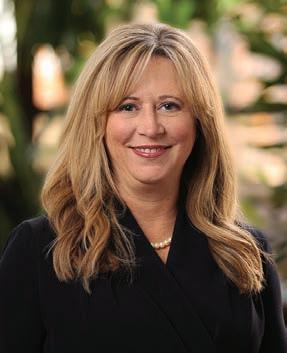 Senior Vice President and Chief Business Officer ITC Holdings Corp
Senior Vice President and Chief Business Officer ITC Holdings Corp
Tanner is responsible for ITC’s federal regulatory, government affairs and communications activities, as well as overseeing the strategic direction, community relations and financial performance for ITC’s four operating subsidiaries: ITC Midwest, ITC Great Plains, ITC Transmission and Michigan Electric Transmission Company (METC). Joining ITC in 2014, she previously served as President of ITC Midwest.
Fostering a more inclusive environment to attract and retain the best talent
When Linda Apsey started her first corporate job in the energy industry, she looked around and realized that she was one of very few women in the executive suite. “I thought to myself, ‘I’ll never last here more than six months,’” she says. “But as I got more engaged in challenging, meaningful work, I felt connected to a bigger purpose.”
Since then, Apsey has worked her way up through the industry, becoming president and CEO of ITC Holdings Corp, which oversees ITC Michigan. Over that time, the company has grown rapidly to build, operate and maintain the electrical infrastructure that sustains our way of life, while meeting the demand for reliable, clean energy. In 2024, ITC Michigan is positioned to execute a $679 million capital plan, which includes the connection of 7,000 megawatts of renewable energy to support customer integrated resource plans.
While the company has grown and changed, so has the diversity of the C-suite. Apsey has fostered a welcoming, inclusive culture where all employees contribute to ITC’s ambitious goals.
Today, ITC is an anomaly in the energy industry, with women making up 66% of its seniorlevel executives. For insight into the impact of inclusivity at ITC and within the broader energy industry, Crain’s Content Studio recently spoke with Apsey and ITC’s chief business officer, Krista Tanner.
CRAIN’S: How do you promote a more diverse and inclusive environment at ITC?
LINDA APSEY: One of my biggest priorities since I became CEO was to be very focused and purposeful around inclusion and diversity. We all deserve to be the best that we can be at work, regardless of your background, so I want everyone to feel like they belong.
The best way for us to break down barriers is to raise our awareness, understanding, and respect for each other. So, we invest an incredible amount of time and energy into establishing

that foundation through education, awareness, and engaging everyone to talk about these issues openly. Personally, I’ve engaged in focus groups across the company because I wanted to hear from our employees about what prevents them from feeling like they belong.
We have established a set of values—what it means to be an employee at ITC—and one of our favorite ones is being better together. This is a team sport, and the more diverse our teams are, the better and more durable our decisions and outcomes are.
How is ITC’s commitment to diversity built into the company’s values and processes?
KRISTA TANNER: It’s a combination of mindset and the right policies. The actions that Linda mentioned – specifically the educational programs and focus groups – have built the foundation of our mindset. Linda has challenged all leaders to conduct their own focus groups. Those focus groups have been one of the most impactful things I’ve done as a leader. Employees have been open and vulnerable with leaders, trusting us with very personal stories. Those experiences have shaped us all to be better leaders, and that sets the foundation and the mindset.
We also have policies in place to be very intentional about diversity. When we hire people, we cast a wider net than we used to, to make sure that we have a diverse candidate pool, and we have diverse interview panels to make sure everyone feels welcome. The policies help ensure that we live our values every day.
If you were offering advice to other companies in industries where men traditionally outnumber women, what would you say are the key ingredients a company must have in place to promote diversity and inclusion?
TANNER: You have to be very intentional. It’s not enough just to want a more diverse workforce; you have to make it happen. It starts with casting a wider net for internships and job positions to make sure we’re getting a diverse pipeline of talent.
APSEY: You need a commitment from the top down, but you need everybody to participate and understand the benefits and value of these efforts. Because ultimately, from a corporate perspective, you want everybody to be their best so that the company can be the most successful it can be.
How does the business benefit from having a more inclusive, collaborative workplace?
TANNER: The energy industry is changing rapidly, and the challenges are only increasing. Several reliable studies show more diverse teams are more innovative and make better decisions, and that’s been our experience, as well. When you’ve got a tough problem, you don’t want an echo chamber; you want lots of ideas, and that’s how you get to the best solution. Part of our secret sauce is that we are innovative because we have such a diverse workforce. When you have a highly engaged and motivated workforce, you can accomplish all the things that we’re trying to do.
APSEY: We do what we do because we want to attract and retain the best talent that we can, and we want everyone here to be as successful as they can be. We have great opportunities and big challenges ahead of us, and ultimately, like Krista said, we’re going to be better prepared to address these challenges and opportunities if we have an engaged, motivated, diverse workforce.
To learn more about ITC, visit itc-holdings.com.

SPONSORED CONTENT
KRISTA TANNER
In 2024, ITC Michigan is positioned to execute a massive $679 million capital plan. A key to the company’s growth ability to take on such projects has been embracing diversity and bringing many voices to the table.
MICHIGAN WOMAN-OWNED BUSINESSES CRAIN’S LIST
Ranked by 2023 revenue
39
ResearchedbySonyaD.Hill:shill@crain.com|Thislistofwoman-ownedbusinessesisanapproximatecompilationofthelargestsuchbusinessesheadquarteredinMichigan.Percentageofthecompany thatiswoman-ownedmaynotbesolelyheldbytheleadingshareholder.Numberoffull-timeemployeesmayincludefull-timeequivalents.Itisnotacompletelistingbutthemostcomprehensiveavailable. Crain'sestimatesarebasedonindustryanalysesandbenchmarks,newsreportsandawiderangeofothersources.Unlessotherwisenoted,informationwasprovidedbythecompanies.NA=not available.
12 | CRAIN’S GRAND RAPIDS BUSINESS | APRIl 1, 2024 Company Address Phone; website Majority owner(s) Revenue ($000,000) 2023/2022 Percent change Michigan employees Jan. 2024/ 2023 Percent womanownedType of business 21 DOWDING INDUSTRIESINC. 449 Marilin St., Eaton Rapids 517-663-5455; dowdingindustries.com G. Christine DowdingMetts CEO $47.6 $53.9 -11.7%NA 230 100Precision machining, metal fabrication, progressive die stampings, welded assemblies, custom laser cutting, double disc grinding, rapid response prototyping 22 LR MANAGEMENT SERVICESCORP. 2150 Butterfield, Suite 210, Troy48084 248-548-4800; LRmanagement.com Leslie Etterbeek founder, president and CEO $44.6 1 $43.2 1 3.4%264 262 85Real estate management company 23 AUTOMOTIVE QUALITY & LOGISTICSINC. 14744 Jib St., Plymouth48170 734-459-1670; aql-inc.com Sangeeta Ahluwalia CEO $37.9 $37.5 1.1%215 196 51Staffing and service to the automotive manufacturing facilities and their suppliers. OEMs like Ford, GM, Mercedes, VW and tier-one and tier-two suppliers 24 CONTRACT DIRECTLLC 24300 Southfield Road, Suite 321, Southfield48075 248-702-5326; contractdirect.net Elizabeth Hammond president $37.7 $49.3 -23.6%87 102 51Facility maintenance services company 25 BLUE CHIP TALENT 43252 Woodward Ave., Suite 240, Bloomfield Hills 48302 248-858-7701; bctalent.com Nicole Pawczuk CEO $35.6 $33.2 7.4%290 260 100IT, engineering, and professional services staffing and talent acquisition 26 PERFORMANCE DRIVEN WORKFORCE 22226 Garrison, Dearborn48124 313-203-3435; pdworkforce.com Lizabeth Ardisana CEO $31.5 $30.4 3.8%244 231 51Human capital management 27 UNIVERSITY MOVING & STORAGECO. 23305 Commerce Drive, Farmington Hills48335 248-615-7000; universitymoving.com Elise Benedict-Howard chairperson $21.4 $20.2 6.1%75 75 51Moving, storage and transportation services 28 EXPRESS EMPLOYMENT PROFESSIONALS 1760 44th St. SW, Suite 10, Grand Rapids49519 616-281-0611; expresspros.com/grandrapidsmi Janis Petrini co-owner and founder $17.6 NA35 NA 75Express Employment Professionals has been serving the West Michigan area since 1996 with a wide variety of staffing, professional recruitment, and training solutions for employers and job seekers. 29 METTLEOPS 31791 Sherman Abe, Madison Heights48071 5863068962; www.mettleops.com Katie Bigelow CEO $15.4 $18.9 -18.3%34 25 100Specializes in military research, development, engineering services, program management, ground vehicle design, test and evaluation and system integration 30 DRIVERSOURCEINC. 22420 Telegraph Rd., Southfield48033 313-624-9500; driversource.net Jinan Dalloo CEO $15.1 $17.3 -12.4%175 NA 51Temporary staffing services 31 CLIPS & CLAMPS INDUSTRIES 15050 Keel St., Plymouth48170 734-455-0880; clipsclamps.com Kathleen Dul Aznavorian chairman $14 $15 -6.7%50 52 66.7Automotive metal stamping 32 TESTING ENGINEERS & CONSULTANTSINC. 1343 Rochester Road, Troy48083 248-588-6200; testingengineers.com Katherine Banicki president and CEO $9.1 $10.4 -12.6%65 61 65Client support from property acquisition through construction, renovation, and restoration. Expertise includes environmental; geotechnical, and more 33 BROGAN & PARTNERS CONVERGENCE MARKETING 535 Woodward Heights, Ferndale48220 248-341-8211; www.brogan.com Ellyn Davidson CEO $6.6 $7.8 -15.7%32 33 100Full service advertising agency including strategy, branding, creative, media placement and analytics 34 REAGAN MARKETING + DESIGNLLC 912 Wealthy St SE, Grand Rapids49506 616-459-4064; reaganmarketing.com Mary Reagan Shapton president and member $5.8 $5.4 8.5%30 NA 100Strategic marketing, communications and design 35 SAN CHEZ BISTRO 38 W. Fulton St., Grand Rapids49503 616-774-8272; sanchezbistro.com Cynthia Lotterman Schneider president $5.2 $4.9 6.1%18 NA 100A deli and events space. Breakfast and Tapas cuisine of Spain, globally inspired street food at Roam, coastal fare at Beacon, quick grab and go at the Express, event space on the Grand River for up to 200 people. 36 MWV ENVIRONMENTAL SERVICESINC. 18407 Weaver St., Detroit48228 313-646-2523; mwvenvironmental.com Katrenia B. Moncrief owner and president $4.8 $3.1 54.7%38 NA 100Our leadership team has over 25 years of accumulative experience in asbestos abatement, mold remediation, selective demolition, tire removal, boarding and securing, and junk removal. 37 ARRAY OF ENGINEERS 2350 Oak Industrial Drive NE, Grand Rapids49505 arrayofengineers.com Stacy Paul CEO $4.8 $4.3 11.6%23 21 51We create innovative, effective, and efficient engineering solutions by elevating each other to reach our highest potential.
GOODMAN VENEGAS INSURANCE AGENCYINC. 2800 Livernois Ste 170, Troy48083 248-740-9090; goodmanvenegas.com
Jessup Goodman president $4 NA10 12 100Commercial insurance agency
38
Regina
SXANPRO 3500 Kraft Ave. SE, Grand Rapids49512 616-813-8002; sxanpro.com
Souffrou CEO, founder $3.6 NA12 NA NASxanPro is an inventory technology company that offers a complete product line that tracks and manages medical supply and capital asset inventories utilizing the UDI.
Ashlea
LR Management fee of revenue collected.
1.

Amway plans $127.6M expansion at Ada campus
By Mark Sanchez
and research and development.
The expansion project includes renovating 48,000 square feet of unused space at the Spaulding Plaza facility in Ada for a manufacturing center producing hard-shell and soft gel nutritional tablets.
The direct-selling giant Amway also will create an innovation and science facility at its main campus on Fulton Street with an 18,750-square-foot addition to support nutrition research and development. The facility’s expansion would include labs, cooling chambers, offices, storage, manufacturing equipment, and other elements to conduct R&D.
The Michigan Strategic Fund board on March 26 approved a $2 million performance-based grant for Amway parent company Alticor Inc. to help offset the higher costs to expand in the state, rather than another location. Ada Township may support the project with a local tax abatement.
Amway intends to close a facility in Southern California by the end of 2026 and consolidate the work in Ada to “increase efficiency and reduce overhead costs,” according to the Michigan Economic Development Corp.
“At the end of the day, we’re very happy to support (Amway’s) efforts to further their investment in Michigan, and specifically in West Michigan, with that consolidation,” said Matt McCauley, senior vice president of regional development at the MEDC.
The state grant also will mitigate “the disruption of business that is anticipated to occur during the transition,” MEDC staff wrote in a memo to Michigan Strategic Fund board members. “This project is vital to the company securing its long-term home in the region and continu-
ing to grow as a strong employer in a small community.”
MEDC staff noted that the Amway expansion “aligns with the state’s goal to position itself as the leader for research and development opportunities.”
The 260 new jobs the company plans to create with the expansion project will pay an average wage of $46.24 per hour, plus benefits. The median wage for the region is $20.09 per hour, according to the MEDC.
Two-thirds of the jobs will go for professional positions in innovation, science and engineering, said Michael Nelson, Amway’s chief operating officer and chief people officer. Amway has already begun hiring for the new positions and transferred some staff from California, Nelson said.
“The state has been Amway’s home since it began more than 60 years ago. We know it is an excellent place to expand our operations due to access to talented individuals, which is why we are investing more than $100 million in our manufacturing capabilities and equipment, new laboratories, and facility improvements over the next three years,” Nelson said.
Amway employs nearly 3,500 people in Ada and 14,000 globally.
“We look forward to seeing the continued growth of an incredible Michigan company,” MEDC CEO Quentin Messer Jr. said.
In March, Amway reported it generated $7.7 billion in sales for 2023, a 5% decline from the prior year that was attributed to the strength of the U.S. dollar and continued effects from the ceasing of operations in Russia in 2022.
For Amway, the results mark the second straight year of declining sales, after generating revenues of $8.1 billion in 2022 and $8.9 billion in 2021. The company’s revenues peaked at $11.8 billion in 2013.
The privately-owned company annually reports sales but does not disclose earnings. Reporter Rachel Watson contributed to this story.

















April 1, 2024 | CrAiN’S GrAND rApiDS BUSiNESS | 13 “I am committed to helping West Michigan businesses obtain the capital they need to grow and help our communities thrive.” Call me to discuss your business financing needs. (616) 780-0995 Derek.Aten@LMCU.org LMCU is pleased to welcome Derek Aten, Vice President SBA Lending LMCU.org STU KINGMA NAMED NAI GLOBAL TOP PRODUCER Out of more than 5,800 professionals in the NAI network worldwide, Stu was in the TOP 12 of all producers in transaction volume for 2023. Thank you, West Michigan, for entrusting your real estate transactions to Stu and each of our agents. STU KINGMA, SIOR skingma@naiwwm.com 616.581.5000 COMMERCIAL REAL ESTATE SERVICES, WORLDWIDE | NAIWWM.COM | 616.776.0100 Inside Amway’s headquarters off Fulton Street in Ada. COUrTESY pHOTO
plans to
Amway
embark on a major $127.6 million expansion in its hometown that it expects will create 260 high-paying new jobs in manufacturing
‘Aggressive’ emission rules could add supplier certainty
By Kayleigh Van Wyk
Finalized federal standards that mandate reductions in vehicle emissions could bring more realistic production volumes to auto suppliers as well as a renewed interest in hybrid vehicles as companies grapple with uncertainty tied to the electric vehicle transition.
That’s according to one West Michigan analyst in response to the Biden administration’s new vehicle emissions standards announced March 20 that are aimed at pushing the auto industry toward more electric and hybrid vehicle sales.
The finalized rules set emissions standards for greenhouse gases, hydrocarbons, nitrogen oxides and particulate matter from new passenger cars, light trucks, and larger pickups and vans.
The U.S. Environmental Protection Agency anticipates the standards will produce a roughly 50% cut in average greenhouse gas emissions for light-duty vehicles and a 44% reduction for medium-duty vehicles, compared to current standards for vehicle model year 2026. The standards will phase in over a six-year period from model year 2027 through
model year 2032.
Automakers and labor groups won some concessions in the final rule from the initial draft in 2023, including extending some compliance targets to model year 2032.
As well, the initial proposal called for EVs to make up an ambitious 67% of all new light-duty vehicle sales by 2032. The EPA now forecasts EVs to account for 30-56% of sales under the finalized rule.
The new standards are expected to cut carbon emissions by more than 7 billion tons and provide around $100 billion in annual net benefits for the U.S. in terms of health, fuel and vehicle repair cost savings, according to the EPA’s estimates.
While industry analyst Mike Wall sees the revised targets as an overall positive, “they’re still pretty aggressive,” he said, especially for suppliers trying to navigate the EV transition amid delayed launches and underwhelming volume projections.
“I’m probably a little more worried about suppliers than I am automakers,” said Wall, executive director of automotive analysis at S&P Global Mobility in Grand Rapids. “On the one hand, hopefully



this will create a little bit more realistic volumes on that front for those suppliers. But I’m also mindful of the fact that suppliers have kind of been through the wringer already with a bunch of battery electric vehicles that are either in launch or will be launching or have launched, and those vehicles are not hitting their volumes. That means suppliers are sitting on a lot of unused capital or very underutilized capital. So, to some extent, they’re feeling the pain right now.”
While electric vehicle sales continue growing year over year, consumers are still dictating with their dollars how the EV transition will pan out, Wall said.
According to Kelley Blue Book, a record 1.2 million electric vehicles were sold in the U.S. in 2023, bringing EVs’ share of the U.S. vehicle market to 7.6%, up from 5.9% in 2022. More than 300 EV models will be available by 2030, up significantly from 26 models available in 2021, according to S&P Global data.
Wall also noted the new vehicle emissions standards could be helpful for boosting education among consumers in the coming years about electric vehicles.


“It’s a testament that this is a longer game in the sense that we’ve got to have education in the consumer, we need more charging infrastructure, we need to get more affordable EVs out there — all of that takes time,” Wall said. “In that sense, I think that’s good.”
However, key target years like 2032 still create a sense of urgency.
“Observers may think, ‘Wow, 2032, that’s so far off,’ but it’s not in automotive,” Wall said. “That’s maybe one and a half vehicle cycles, depending on the vehicle and the platform.”
Until then, the new vehicle emissions standards may likely pave the way for advancements in hybrid vehicle technology. Wall said S&P Global Mobility has seen more automakers start to “dust off the playbooks of hybrid” to help meet com-
pliance targets and serve as a bridge to later EV adoption.
“That is a technology that I think is more easily deployed to the consumer and understandable by the consumer in some ways,” Wall said. “Having that kind of flexibility in the case of dealing with consumer optionality can go a long way.”
Meanwhile, the Biden administration’s vehicle emission standards issued during this presidential election year have drawn criticism from GOP lawmakers and consumers who see the proposal as a threat to domestic manufacturing and gasoline-powered vehicles as drivers know them.
As the election year unfolds, Wall anticipates the emissions standards and overall EV transition will remain a key topic surrounding the November election.


14 | CRAIN’S GRAND RAPIDS BUSINESS | APRIl 1, 2024 HIGHER DEGREES OF IMPACT SEIDMAN GRADUATE PROGRAMS EXECUTIVE MBA • PROFESSIONAL MBA • MSA • MST • Curriculum that balances proven theory and real-world, industry-relevant experience • Delivered by a trusted partner in the business of developing talent for what’s next • Located in the heart of West Michigan’s business center COLLEGE OF BUSINESS www.gvsu.edu/seidmangrad
Metro Detroit-based ATC Drivetrain, which specializes in the remanufacturing of EV components, batteries, transmissions and engines, announced plans in late 2023 to invest $7.9 million to build a new electric vehicle-focused facility in Holland. | ATC DRIVETRAIN





Your Business Your Way
Looking to set your dreams in motion and start growing your business? MSUFCU offers the products and services you need to set you up for success including:
eDeposit — Save time by depositing checks electronically.

Merchant Processing — Accept all major credit cards and have the funds deposited into your MSUFCU business account.
PositivePay — Protect your company with automated fraud detection that verifies and reconciles your checking and ACH transactions before final payment.
Business IMMA — Earn higher dividends on savings.
Contact our Business Services team or visit a local branch today!
msufcu.org/business | 616-552-6734



Federally insured by NCUA
Rivian leasing space locally for second service center
By Kayleigh Van Wyk
Rivian Automotive Inc. is leasing 13,000 square feet of space at an industrial park south of Grand Rapids for what’s expected to be the electric vehicle maker’s second service center in Michigan.
The Irvine, Calif.-based Rivian (Nasdaq: RIVN) is leasing the space at 5225 68th St. SE in the Crossroads Commerce Park in Caledonia Township.
The park property is owned by 1379 Comstock Street LLC, an entity registered to Greg Kerkstra of Kerkstra Precast Inc., a Grandville-based producer of precast and prestressed concrete products that was acquired by Fabcon Precast LLC in 2021.
Kerkstra confirmed via email that Rivian is leasing the space but did not provide further details about the facility.
A spokesperson for Rivian has not returned requests for comment to confirm whether the service center is open. Rivian’s website indicates a service center is “in the works” at 5225 68th St. SE.
On a recent visit to the property, the space included a lobby and guest area, an employee break
room and a door to an area labeled “service center.” At least three Rivian employees as well as guests were present in the building when Crain’s visited the location.
A construction lien filed with Kent County in December 2022 indicates Rivian’s facility consists of 13,000 square feet of office and warehouse space built out by Grand Rapids-based First Companies Inc.
The service center is located in the Crossroads Commerce Park, which consists of four multitenant buildings on 68th Street SE in Caledonia.
Previously, Rivian’s only dedicated service center in Michigan has been located in Madison Heights in metro Detroit.
Founded in 2009 as Avera Motors in Rockledge, Fla., Rivian relocated to Plymouth, Mich., in 2015, where it still maintains a location that functions as a vehicle development, prototyping, testing and administrative facility
In 2021, Rivian announced plans to transfer most of its engineering and product development staff in Plymouth to its current headquarters in Irvine.
Later in 2021, the company
shared plans to invest $4.6 million and add 100 workers in Plymouth following the first launch of its R1T electric pickup.
Rivian currently produces the R1T and the R1S electric SUV model. The company’s smaller R2 and compact R3 electric SUV models are forthcoming.
As well, Rivian produces electric delivery vehicles for Amazon, which began as an exclusive agreement in 2019. Late last year, it was reported that Rivian’s commercial electric vans would become available to other companies.
In recent weeks, Rivian has suspended construction on a new manufacturing plant in Georgia near Atlanta, where the company planned to build the R2 models. Instead, that production will take place at Rivian’s existing plant in Normal, Ill.
Rivian went public in November 2021 and raised close to $12 billion in its initial public offering priced at $78 a share.

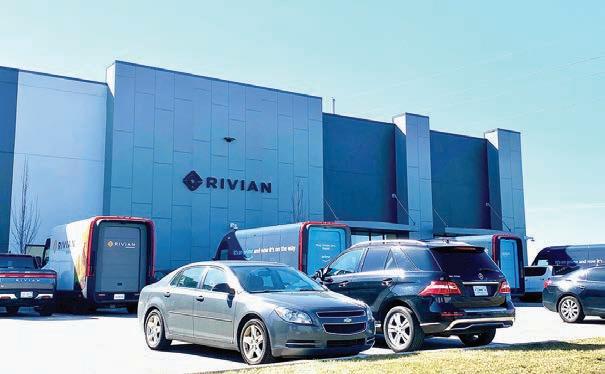
In the company’s 2023 full-year financial results, Rivian reported more than $4.4 billion in total revenue, jumping from about $1.7 billion for the prior year. The automaker posted a net loss of $5.43 billion in 2023 as it burned through cash, and announced plans to trim 10% of its salaried workforce.
The company delivered 50,122 vehicles from 57,232 vehicles produced in 2023. Rivian is forecasting flat production this year.






16 | CRAIN’S GRAND RAPIDS BUSINESS | APRIl 1, 2024
Rivian’s R1S. COURTESY OF RIVIAN
Rivian is leasing this space in Caledonia Township south of Grand Rapids. | KAYlEIGH VAN WYK
Visit our new website at weareprogressive.com DESIGNING A BOLD NEW FUTURE Progressive AE is now Progressive Companies From modest beginnings of four original engineering partners in 1962, to over 270 employees across the nation today, Progressive AE embraces the need for change. While design remains core to our business, the range of services has grown to include Universal Design consulting, change management, sustainability leadership, controlled environments, program management, and capital planning.
shift to Progressive Companies offers greater flexibility as the firm continues to diversify beyond architecture and engineering. TRANSFORMING SPACES. EMPOWERING PEOPLE. Flexco Manufacturing
The
Insurance unlikely to cover disruptions from water main break
By Mark
Sanchez coverage, she said.
Companies that were disrupted and lost business and revenue because of the Grand Rapids water main break and resulting boil water advisory from March 17-20 likely won’t find any relief through their insurance coverage.
Commercial policies and business interruption insurance products that cover losses from a disruption to the business generally require a direct physical loss such as a fire or damage from a severe storm or vandalism to trigger coverage, according to experts. Lost sales and revenue from a situation that affected a large portion of northeast Grand Rapids last month typically are not a covered claim, unless the business specially has such events written into its policy.
“It will always come down to the individual policy language that the business has,” said Jeff Koelzer, a partner at Varnum LLP in Grand Rapids. “A disruption in a municipal utility usually will be excluded under a standard business property insurance policy.”
Insurance carriers generally exclude issues such as public infrastructure failures from policies to mitigate their exposure, Koelzer said. When writing a policy, insurance companies usually look at “the four corners of your property, and the types of risks that befall your property, and the damage you might suffer and the things they can control,” he said.
“It becomes difficult for them to put a number on the risk, basically, of utility interruption because it goes outside the scope of your property,” Koelzer said. “But for certain industries or certain businesses, if you’re willing to pay for it, they’re willing to underwrite it. That would take the form of an endorsement to the policy.”
Grand Rapids issued the boil advisory March 17 after a water main break on the northeast side. The boil water advisory was in effect until March 20.
The advisory zone covered a large area of northeast Grand Rapids that included most of downtown, causing disruptions for many businesses such as restaurants and coffee shops that cannot rely on just bottled water alone.
Koelzer and others advise business owners to review their commercial insurance policies and business interruption coverage, if they have it, to determine whether a disruption from a water main break is a covered claim, especially if they have an added endorsement.
“It’s like jumping through hoops. You have to jump through hoops to take a look at your own commercial property policy and see what it says to see if there’s coverage. There might be if there’s an endorsement,” said Carly Zagaroli, a partner at Warner Norcross + Judd LLP who chairs the Grand Rapids law firm’s insurance practice group.
An exception to the coverage exclusion can occur when a water main break causes flooding that damages a business, Zagaroli said. That type of situation could trigger
“If there’s an infrastructure break somewhere and that affects you, you still have to have a physical loss, generally, and it’s on your own property,” Zagaroli said.
Business interruption coverage is generally written into business owner policies and covers lost income and supports payroll and other ongoing expenses.
Even if a company has business interruption insurance, the coverage usually includes one- to threeday deductible periods before coverage kicks in following a covered event, said Bob LaVallee, senior
vice president of commercial insurance at the Grand Rapids office of Hub International, an insurance brokerage.
“They have to be down and out for three days before they can even file a claim,” LaVallee said.
As far as the city’s liability, municipalities are protected under a state immunity law as long as they are acting in “good faith,” he said.















April 1, 2024 | CrAiN’S GrAND rApiDS BUSiNESS | 17
TO LEARN MORE, SCAN OR VISIT CRAIN-HOMES.COM WASHINGTON TOWNSHIP | turnkey 4 BED | 5.2 BATH | 12,144 TOTAL SQ. FT. 248.703.9609 CRAINHOMES@CRAIN.COM 320 Martin Street, Suite 200 Birmingham, MI 48009
A sign on the door at Terra Bagel in downtown Grand Rapids last month alerted customers that the location was closed because of the boil water advisory. It has since reopened. | JOE BOOMGAArD
over $2.4B battery
By Kurt Nagl
Chinese battery manufacturer Gotion Inc. is suing the township where it plans to build a $2.4 billion electric vehicle battery factory, alleging breach of contract in relation to the project.
Chuck Thelen, vice president of Gotion’s North American operations
The company filed a lawsuit March 15 against Green Township, which is just north of Big Rapids, in U.S. District Court Western District of Michigan, claiming that in November it “abruptly reneged” on contractual obligations established for the project in 2023.
“The only thing that changed between October and November was the composition of the Township’s Board, most of whose members are now ardently opposed to Gotion’s project,” according to the complaint, written by Gotion attorney Ashley Chrysler with Warner Norcross + Judd LLP.
At immediate issue in the federal lawsuit is the construction of water infrastructure for the project, which is promised to bring 2,350 new jobs and dramatic change to the rural community.
“It’s unfortunate that Gotion has had to resort to litigation to get the township to comply with their obligations under the agreement.”
Township board members aim to block an extension of a water line running from Big Rapids through its boundaries to serve the plant despite previously entering into a development agreement allowing it. Water is “critical” to the success of the factory, which will require up to 715,000 gallons per day to operate, according to the lawsuit.
“The (Green Township) Board gave no justifiable reason for its sudden refusal to honor its contractual obligations,” the lawsuit said.
The broader issue is general opposition to the plant by newly elected township board members who replaced pro-factory board members in a November recall
election.
“To prevent the Township’s sudden recalcitrance from unraveling an endeavor already years and millions of dollars in the making, this Court should order the Township to comply with its obligations under the parties’ agreement by, among other things, reinstating the resolution to approve the connection of the City’s water systems to Gotion’s project,” the lawsuit said.
Green Township has 21 days after the filing to answer the complaint. Crain’s made multiple requests for comment to the township.
“It’s unfortunate that Gotion has had to resort to litigation to get the township to comply with their obligations under the agreement,” Chuck Thelen, vice president of Gotion’s North American operations, said in a statement. “We’re unable to comment further since this is now an ongoing legal matter.”
Since the project was announced in October 2022, it has been wrought with controversy. Critics have said the factory will do more harm than good to the tight-knit community, while conspiracists have called it a Chinese Communist takeover plot.

Gov. Gretchen Whitmer and economic developers have heralded the project as a once-in-a-generation opportunity to grow wealth in a poor community. Other politicians, primarily Republicans, have raised national security concerns over doing business with a company tied to China.
In February, Gotion began cutting down trees at the factory site, which spans 270 acres of land purchased by the company for $24 million, marking the first physical progress on the project. Soon after, the company announced a new office in downtown Big Rapids, where it intends to have 200 employees.
Gotion Inc. is a subsidiary of China-based Gotion High-Tech Co. Ltd. that was established in Califor-
nia in 2014. Volkswagen is the company’s largest shareholder, with a 24.7% stake. Chinese national Li Zhen, who is the founder and president of the company, is the next largest shareholder at 13.6%.
The plant near Big Rapids would produce up to 400,000 tons of cathode material annually for lithium-ion EV battery packs assembled in Illinois, where Gotion is planning a $2 billion factory.
Michigan officials approved $715 million in incentives for the factory, including $175 million of funding from the Strategic Outreach and Attraction Reserve and a 30-year Renaissance Zone property tax abatement valued at $540 million.
Kurt Nagl is a reporter for Crain’s Detroit Business.



18 | CRAIN’S GRAND RAPIDS BUSINESS | APRIl 1, 2024
plan
Gotion sues township
factory
| GOTION INC.
Conceptual plans for
Gotion’s
$2.4 billion battery manufacturing plant near Big Rapids.
SAVE THE DATE and JOIN US! May 9, 2024 The Pinnacle Center, Hudsonville Igniting Greatness in Companies and Their People Visit our website at https://bit.ly/WMRegister24 to register to attend, or call 866-321-1822 Join us as we honor West Michigan’s elite leaders who have proven they are employers of choice with Awards Emcee: Steve Kelly, Morning Show Host, WOOD Radio 1300
Union representation at LMCU branch ends after tie vote
By Mark Sanchez
A tie vote ended union representation for staff at a Lake Michigan Credit Union branch in Wyoming.
A little more than a year after workers voted in the Communications Workers of America, the union failed to get enough votes in a March 1 election on whether to retain the bargaining unit.
valid ballots has not been cast for any labor organization and that no labor organization is the exclusive representative of the employees in the bargaining unit.”
“LMCU respects the rights of employees to organize but does not support outside unions’ involvement within LMCU, as these organizations are oftentimes divisive, have their own agenda, and don’t necessarily have the best interests of its employee members at heart,” Lake Michigan Credit Union said in a statement to Crain’s Grand Rapids Business. “The decertification allows LMCU to work directly with employees at the South Division branch rather than having to work through a third party to ensure they have the same full support and benefits, in a timely fashion, as their non-union employee counterparts.”
“LMCU respects the rights of employees to organize but does not support outside unions’ involvement within LMCU, as these organizations are oftentimes divisive, have their own agenda, and don’t necessarily have the best interests of its employee members at heart.”
Lake Michigan Credit Union
The National Labor Relations Board certified the election results March 13, stating in a notice to the credit union that “a majority of the
The election included full-time and part-time tellers and member service representatives at the LMCU office at 3870 South Division Ave. who originally petitioned the NLRB in December 2022 for a vote to join the CWA and form

the Lake Michigan Credit Union Workers Alliance. Seeking better pay and working conditions, workers at the South Division Avenue branch then voted in early January 2023 to join the CWA.
Lake Michigan Credit Union later fired the organizer of the union drive, Ivan Diaz, who worked at the South Division branch for nearly five years and said he was told by credit union management that he committed “a violation of policy.”
Acting on an unfair labor practice charge the CWA AFL-CIO filed on Diaz’s behalf, the NLRB in December 2023 filed a formal complaint against Grand Rapids-based Lake Michigan Credit Union claiming that Diaz was improperly
SPONSORED CONTENT
fired and seeking his reinstatement with back pay.
Staff at the South Division office subsequently filed another petition with the NLRB on Feb. 2 for a new vote on whether to retain the union.
The election’s result “is a demonstration of that team’s comfort and confidence that LMCU is the right place for their professional development and career growth,” said Don Bratt, senior vice president and chief marketing officer at Lake Michigan Credit Union. “We will always do what is right to help and protect our members and ensure that our employees have a working environment where they can contribute and
Healthy Workforce, Wealthy Bottom Line: The Power of Population Health Management







 Jason Nickel, Senior Vice President
Jason Nickel, Senior Vice President
In the realm of employee bene ts, there’s a transformative approach gaining traction: Population Health Management (PHM). For employers seeking to optimize the health and productivity of their workforce while containing healthcare costs, understanding PHM is essential.
At its core, PHM is a strategic method aimed at enhancing the overall health outcomes of a de ned group, typically employees and their dependents. Rather than viewing healthcare through a narrow lens of individual treatments, PHM takes a holistic approach, considering the collective wellbeing of the entire population. So, what does this mean for employers? It translates
into proactive initiatives designed to prevent illness, manage chronic conditions, and promote overall wellbeing among employees. Here’s how a successful PHM strategy can bene t an organization:
1. Preventive Care Emphasis: PHM encourages a shi towards preventive healthcare, focusing on early detection and intervention to stave o potential health issues before they escalate. By investing in wellness programs, health screening, and lifestyle management initiatives, employers can help employees stay healthy and productive.
2. Chronic Disease Management: Many employees grapple with chronic conditions like diabetes, hypertension, or obesity, which can signi cantly impact their quality of life and work performance. PHM facilitates e ective management of these conditions through coordinated care, personalized interventions, and support services, ultimately reducing absenteeism and healthcare costs.
3. Engagement and Empowerment: Central to PHM is the notion of engaging employees in their health journey. By providing resources, education, and incentives,
employers can empower individuals to make informed decisions about their wellbeing, fostering a culture of health and accountability.
4. Cost Containment: By prioritizing preventive care and chronic disease management, PHM can yield substantial cost savings for employers. By mitigating the need for expensive medical treatments and reducing absenteeism, employers can e ectively manage healthcare expenditures while improving the bottom line.
In essence, Population Health Management represents a paradigm shi on how we approach employee health and bene ts, with success relying on a deep understanding of the plan data and a proactive bene ts partner that isn’t afraid to challenge the status quo.
When it comes to navigating the complexities of PHM, Alera Group has a wealth of tools and in-house expertise to help employers achieve their goals. We focus on:
• Data-Driven Decision Making: We leverage healthcare data to inform long-term strategic plan decisions, ensuring that every step is backed by comprehensive insights
tailored to your population’s unique needs.
• Cutting-Edge Risk Identi cation: Utilizing Johns Hopkins ACG System, we identify both current and future risks, allowing for e ective implementation of proactive measures.
• Performance-Oriented Approach: Alera Group assists in setting objective goals for vendors, leveraging these benchmarks to develop performance guarantees that drive accountability and excellence.
• Future-Focused Solutions: By identifying future cost drivers and connecting them to the correct resources, we ensure your PHM strategy remains adaptable and forward-looking, safeguarding your business from unforeseen challenges.
For more information on implementing a Population Health Management strategy at your organization, contact Jason Nickel: (616) 745-3525, JNickel@lighthousegroup.com


thrive.”
A union representative could not immediately be reached for comment.
Lake Michigan Credit Union has 70 offices in Michigan and in markets on Florida’s Gulf Coast.
The largest credit union in the state, Lake Michigan Credit Union ended 2023 with $13.37 billion in total assets, a 12.3% increase from a year earlier, and grew total deposits during the year by 9.2% to $11.25 billion, according to a quarterly financial report to the National Credit Union Administration.
The 486,543-member credit union recorded 2023 net income of $172.2 million.
PHM CLIENT CASE STUDY
• Client had locations across the country and needed to understand unique needs
• Client had signi cant investments in an onsite clinic and no indication of the impact
• Pharmacy spend was increasing at an unsustainably high rate
After meeting with the client, Alera Group put a strategy in place that included integrating data from all sources and vendors, auditing PBM data, evaluating vendor programs, and identifying unique needs by state. This enabled the client to select a better onsite partner, eliminate ineffective vendor partnerships, and change their specialty medication strategy, resulting in:
• A 22% reduction in plan spend over two years.
• $1.9M saved in specialty medications in one year.
• Improved member health and reduced dependency on the healthcare system.
April 1, 2024 | CrAiN’S GrAND rApiDS BUSiNESS | 19
CRAIN’S CONTENT STUDIO
Lake Michigan Credit Union is Michigan’s largest credit union. | COUrTESY MAGE
Trinity Health acquires Grand Rapids medical practice
By Mark Sanchez
Acquiring a Grand Rapids-area rheumatology practice begins to fill a service gap for Trinity Health’s medical group.
The health system now hopes to leverage the acquisition of West Michigan Rheumatology PLLC to recruit other rheumatologists to the West Michigan market, a task that becomes easier with an existing practice. Trinity Health Medical Group currently is working to recruit two additional rheumatologists to the market and examining the potential for satellite clinics on the lakeshore, where a practice in Muskegon recently closed. The health system also is weighing the use of telehealth for the medical specialty that’s in short supply.
“We are in growth mode with rheumatology,” said Dr. Lisa Kinsey Callaway, chief medical officer for Trinity Health Medical Group.
“Having an established rheumatology group does make recruitment more desirable for a candidate who may be looking to move into the West Michigan market. It’s very difficult to start an independent practice these days from the ground up,” Kinsey
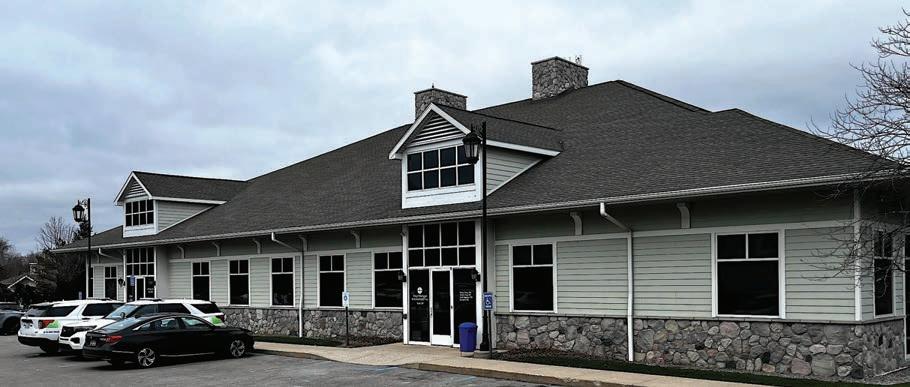

Callaway told Crain’s Grand Rapids Business. “A rheumatology fellow graduating wouldn’t say, ‘Oh, I think I’ll just go and buy a building and start a practice over in West Michigan.’ The mentorship that a new graduate is desiring is automatically there when you already have a base of rheumatologists who are experienced having that person to network and review cases with.”
Three rheumatologists from West Michigan Rheumatology — Drs. Richard Martin, Aaron Egge-
tient to get an appointment, Kinsey Callaway said.
“As we had been looking at trying to stabilize having this access of rheumatology for the medical group in West Michigan, we had been looking at this opportunity, obviously, and looking at kind of market presence and trying to ensure that our patients had access to the specialty care that they need at the time when they needed it,” she said.
Terms of the acquisition were undisclosed.
The growth mode for rheumatology also extends to other medical practices for Trinity Health.
been and Eric Slavin — joined Trinity Health Medical Group on March 1. The practice, located at 1155 East Paris Ave. SE in Grand Rapids Township, goes back more than 30 years.
ket.
Buying the practice “allows us to expand our ability to provide integrated, coordinated and seamless
“We are in growth mode with rheumatology.”
Dr. Lisa Kinsey Callaway, chief medical officer for Trinity Health Medical Group
The practice for years had an affiliation with Trinity Health Medical Group. The acquisition comes after rheumatology practices closed in Muskegon and Grand Rapids in the last couple of years, creating service gaps in the mar-
care to our patients,” said Stacey Merren, chief operating officer at Trinity Health Medical Group West Michigan. Trinity Health Medical Group previously did not employ rheumatologists. Medical staff surveys have consistently found the specialty has long wait times for a pa-
While the medical group is not actively pursuing acquisitions, Trinity Health will consider opportunities for primary care and specialty practices that may arise. It’s also interested in crafting affiliations with independent medical groups, as part of an ongoing growth strategy, Kinsey Callaway said.
“We aren’t going out there and advertising for acquiring practices,” she said. “However, when those opportunities present themselves, we do a discernment of due diligence and look at the opportunity and really want to make sure that those practices are in alignment with our Trinity mission vision values in our culture.”



20 | CRAIN’S GRAND RAPIDS BUSINESS | APRIl 1, 2024
NOMINATE BY MAY 10 CrainsGrandRapids.com/NotableNoms Recognize a construction or commercial real estate leader who has worked on
projects.
West Michigan Rheumatology PLLC operates from 1155 East Paris Ave. SE in Grand Rapids Township. | COURTESY PHOTO
significant
Dr. Kinsey Callaway

Gun Lake Casino launches $10M expansion project
By Rachel Watson
Gun Lake Casino started construction last month on an extensive interior renovation that will add a new restaurant, bar and lounge as well as a high-stakes gaming room.
The casino, a venture of the Match-E-Be-Nash-She-Wish Band of Pottawatomi, or Gun Lake Tribe, located at 1123 129th Ave. in Wayland Township, began construction March 18 on a $10 million interior renovation.
When completed at the end of this year, the project will add a new high-limit table games room, the casino’s fifth restaurant, Lucky Dragon Noodle Bar, and a new Crossroads Casino Bar and lounge.
The area being renovated is to the right of the casino’s south entrance. Guests will notice the temporary relocation of some table games, slots and the existing grab-and-go food venue during construction.
Grand Rapids-based Pioneer Construction is the builder for the project. Las Vegas-based hospitality and gaming architect JIVE Architecture designed the high-limits game room and the noodle bar. Memphis-based HBG Design is the architect for the bar and lounge.
General Manager Jose Flores said the casino’s other four restaurants have been “performing really well,” but the casino needed more dining space and a fresh concept.
“We think a noodle bar is an exciting concept because it brings an element of dining and a variety of cuisine that we don’t currently have here at the facility,” Flores said.
Of the other restaurants, Harvest Buffet opened in 2018 and offers a variety of Mexican, American and Asian fusion dishes. Shkodé Chophouse, CBK and 131 Sports Bar opened in September 2020. The former offers high-end steakhouse fare, and the other two concepts offer a mix of craft beer and pub food.
The casino is still recruiting a chef for Lucky Dragon, so the menu concept is yet to be finalized. Even so, Flores expects
Former employees file suit against logistics company
By Kayleigh Van Wyk
Multiple former employees are accusing a large Kentwood-based freight brokerage of violating federal labor and state privacy laws in a new lawsuit affecting potentially hundreds of current and former workers.
Lucky Dragon will offer a range of Asian cuisines, such as Chinese classics, Japanese sushi, and Vietnamese noodles and bánh mì.
The Lucky Dragon Noodle Bar will be adjacent to the high-limits game room, and the two concepts will share a certain synergy. The game room will feature Baccarat, a table game that is particularly popular among the casino’s fast-growing Asian clientele, which should mesh well with the fare next door, Flores said.
“We really anticipate a lot of flow and energy in between the two spaces,” he said, noting that there will be a window with open blinds in the adjoining wall to provide patrons on both sides a good visibility of the offerings.
The renovation also includes a complete demolition and redesign of the existing Crossroads bar, which currently lacks a lounge. The new space will feature separate but adjacent bar and lounge areas that will seat 40 patrons each.
“We find that our guests, sometimes they just want to sit down, have a conversation with a group of people (and) they don’t necessarily want to be at a slot machine or at a table game,” Flores said. “We currently don’t have an area that meets that need.”
Gun Lake Casino CEO Sal Semola said in a statement that the interior renovations continue the casino’s “commitment to enhancing the guest experience through innovation and excellence.”
The interior renovation is happening at the same time as Gun Lake Casino’s $300 million, phase five expansion.
When completed in 2025, it will add a 252-room hotel with a spa, multiple indoor swimming pools, a 24-hour restaurant called Sand Hill Café in homage to the casino’s former eatery of the same name, as well as quick-service pool concessions and grab-andgo options.
Wawyé Oasis, the large glasstopped structure that’s rising next to the hotel, will feature a pool, cabanas and an entertainment venue that is expected to host live music and pool parties on the weekends.
The lawsuit against B&L Systems LLC, which does business as Fifth Wheel Freight and is among the top 100 logistics firms in North America, was filed on March 1 in the U.S. District Court for the Western District of Michigan. The suit seeks class action status, as the plaintiffs estimate 500 to 1,000 current and former employees could be owed wages after not receiving overtime pay.
The former employees are represented by Chicago-based Voelker Litigation Group; Chicago and Douglas, Mich.-based Karmel & Torres LLC; and Chicago-based Fox & Fox S.C.
“There’s a lot more to this case than, at least in my opinion, a typical overtime case where a company is caught not following the laws and not paying their employees overtime,” said Daniel Voelker, attorney and founder of Voelker Litigation Group.
Fifth Wheel Freight officials did not respond to a request for comment.
In the complaint, former employees Garrett Schuler, Robert Maurer, Matthew Groh and Camer-
on Bonney accuse the company and two executives of violating the federal Fair Labor Standards ACT (FLSA) and the Michigan Improved Workforce Opportunity Wage Act (MIWOWA).
The lawsuit accuses Fifth Wheel Freight of intentionally violating the FLSA by “requiring and permitting” the former employees and other workers at the company to work more than 40 hours per week without receiving overtime pay, and misclassifying them as “exempt” employees while they worked in non-exempt logistics and sales roles.
The former employees claim they were encouraged or sometimes demanded to “be ‘on-call’ 24 hours a day, seven days a week, 365 days a year,” despite working firstshift hours, per the court filings. The complaint adds that the company’s employee handbook states normal work hours for the first shift are from 8 a.m. to 5 p.m.
Per the complaint, Fifth Wheel Freight also operates a second shift with hours of 9 p.m. to 6 a.m. Voelker said the company was “trying to save money by essentially forcing its employees to work after 5 p.m. until the second shift clocked in” to avoid a third shift that would reduce profits.
As well, the lawsuit accuses Fifth Wheel Freight of violating state privacy law by requiring employees to download an app on their personal cell phones that tracks missed calls
from customers and automatically records and transcribes both professional and personal calls, regardless of the time of day.
According to Voelker, the app not only records calls but uses GPS technology to monitor employee whereabouts, during or after regular work hours. He said the employees were not fully aware of the extent of the app’s monitoring features, only that it had the capability to forward work calls to their personal phones since the company did not provide work phones.
“I think the most egregious part of it is the kind of pressure they put on (employees) by basically saying, ‘Look, we know where you are, we know what you’re doing, and we know who you’re talking to. We know what calls you pick up, which calls you don’t,” Voelker said.
“I suspect we’re going to see a complete change in behavior of the company now that the lawsuit has come out,” he added.
In the lawsuit, Schuler says he complained to the company multiple times about the lack of proper compensation for himself and other employees for working overtime.
On Feb. 12, 2024, Schuler was terminated from the company “in retaliation for his complaints,” according to the lawsuit.
Maurer, Groh and Bonney were employed at the company until February 2024, January 2023 and February 2023, respectively.

April 1, 2024 | CrAiN’S GrAND rApiDS BUSiNESS | 21
CON FLUE NCE presented by THOUGHT SERIES REGISTER CONFLUENCE FEST.COM @ UNLOCKING CREATIVE CAPACITY: HOW TO BUILD A RAINFOREST INNOVATION ECOSYSTEM APRIL 16–17 / GRAND RAPIDS Gun Lake Casino in Allegan County’s Wayland Township. | MiCKEY CiOKAJlO
Michigan keeps creating incentives to leave the state
Gov. Gretchen Whitmer’s “Growing Michigan Together Council” report should have contained new ideas for attracting residents, but it only repeats our state’s history. It is a new edition of an old story in which the state buys or creates expensive reports that conveniently justify and excuse what state officials wanted to do anyway.

The report is stuffed with old ideas and tired concepts. It has 54 references to “funding” – translation: raising taxes. The report also claims we can improve our economic well-being with taxpayer handouts to corporations, unions and other favored groups. In other words, hike job-killing taxes and spend the money on demonstrably ineffective subsidy programs.
Taxes matter, not just to economic growth but also to interstate migration. Michigan is quickly losing ground to competitors. Fourteen states have individual income tax rate reductions that take effect in 2024, according to the Tax Foundation. Meanwhile, Michigan’s income tax rate is expected to increase from 4.05% to 4.25%. As the tax gulf expands between the Great Lakes State and others, people will continue to move to other states for better opportunities.
COMMENTARY

In 2010, the Mackinac Center asked Professor Michael Hicks of Ball State University to conduct a study about what causes people to move from one state to another. Among other findings, he reported that for every 10% increase in the differential between Michigan’s state and local taxes and those of other states, an additional 4,700 of our citizens may move away every year. The income tax hike the state imposed under Gov. Jennifer Granholm conceivably chased tens of thousands of our fellow citizens from our beloved state. And that’s just one tax increase.
The Democrats who control state government today look to do more tax-related damage to state population trends. Last fall, Whitmer called for a paid family and medical leave law, which would increase payroll taxes to cover the extra costs of mandated benefits. The Michigan Chamber of Com-
merce examined the bills widely viewed as the legislative vehicle for this idea and estimated the annual tax cost increase at $1 billion. In December, a tax increase on cigarettes and related products was introduced; it will likely take another $400 million.
These tax hikes do not involve the corporate handouts so popular with many state politicians. Whitmer’s population council has recommended giving more money to favored businesses. This would be on top of the staggering $4.1 billion in corporate welfare authorized by the Legislature in 2023 alone. The spending included hundreds of millions in subsidies for the controversial and hyper-secretive deals with Ford/CATL and Gotion Inc.
Maybe all of that would be fine if the subsidy programs worked, but scholars have found that subsidies for big corporations
have instead a “starkly negative” employment impact. Smaller firms may do better with such deals, but not always.
Evidence also shows that specific assistance for specific purposes — like underwriting business incubators as well as green and high-tech jobs — has not been a cost-effective gambit either, particularly in Michigan. One 2010 study that included 32 incubators from Michigan found that incubated firms did not have higher survival rates, sales or employment growth.
Past Michigan-specific subsidy programs that targeted smaller high-tech or green firms, such as the Michigan Economic Growth Authority or 21st Century Jobs Fund, also have failed miserably. My 2020 study with Michael Hicks showed that each created jobs, but at a cost of incentives offered of between $125,000 and $330,000 per job per year. That is not a sustainable level of spending.
Lansing lawmakers want to impose job-killing taxes under the ruse of creating jobs then spend the money on business subsidies that have been repeated and expensive failures. It’s a formula designed to fail.
There’s a better way. Scholars have studied what makes a state’s population grow and what causes people to move from one state to another. My colleague, Hannah Kling, has reviewed nearly 100 studies and published a review of the findings. What works are uncomplicated and low taxes, lighter regulatory burdens on the labor market, and quality public services. This can improve inbound migration and thus, population growth, more than any exotic industrial policy programs.
Michigan should embrace state-based health exchange
State lawmakers have the chance to put Michigan – and Michiganders – on a healthier path for years to come. With Senate Bills 633-638, state legislators can establish a state-based exchange that would give residents the chance to shop for affordable health coverage and give Michigan the chance to direct more resources toward low-income and other underserved residents who lack coverage.

In 2021, 39% of Michiganders — nearly 4 in 10 — were unable to pay for basic necessities like rent, food, and childcare, according to a joint report released in 2023 from the Michigan Association of United Ways (MAUW) and United for ALICE. The report also showed that 6.7% of Michiganders did not have health care coverage.
Many Michiganders don’t receive health care coverage through their employers or don’t know they qualify for fi-
nancial assistance to purchase it on their own. People who don’t have health insurance have difficulty affording preventive care, following their health care provider’s recommendations, or getting help with a serious medical issue. This lack of coverage can result in even worse health issues, hospitalization, and high medical bills that can make it even harder to pay for basic necessities. According to the Kaiser Family Foundation, 16 million people in the U.S. have over $1,000 in medical debt and 3 million owe more than $10,000. Even though this can happen to anyone, low and middle-income Americans are more likely to be exposed to medical debt.
Michigan’s poverty rate in 2022 was 13.4%, higher than the national rate of 11.5%. In addition, the average personal income of $57,038 places Michigan among the lowest of states in the Midwest and far
below the national average of $65,470. While the state has over 3.2 million Medicaid enrollees, pandemic-era protections have ended, and officials are re-determining their eligibility. As of January 2024, 450,000 individuals have already been disenrolled and lost coverage. Michigan lawmakers can help Michiganders access affordable health care by establishing a state-based exchange under Senate Bills 633-638.
State-based exchanges can play a critical role in managing the churn between Medicaid and Affordable Care Act health insurance and vice versa. A state-based exchange in Michigan could work closely with Michigan Medicaid to ensure that eligibility determinations are tightly coordinated and streamlined. This can help to reduce the administrative burden on individuals and confirm they are enrolled in the appropriate plan based on their eligibility status, versus facing coverage gaps.
savings. The state currently operates on HealthCare.gov, also known as the Federally Facilitated Marketplace, and staying on that platform comes at a price. The Department of Health and Human Services charges platform fees that are 2.75% of premiums — a cost that is passed along to Michigan consumers. In 2023 alone, the
In 2021, 39% of Michiganders — nearly 4 in 10 — were unable to pay for basic necessities like rent, food, and childcare
more than 320,000 enrollees in the state are expected to pay the federal government close to $46 million in fees as part of their monthly premiums.
Michigan could also realize operational
With the passage of Senate Bills 633-638, Michigan can take significant steps to make sure struggling individuals and families have access to the affordable health insurance they need and deserve.
22 | CRAIN’S GRAND RAPIDS BUSINESS | APRIl 1, 2024 Sound off: Send a column for the Opinion page to tim.gortsema@crain.com. Please include a phone number for verification purposes, and limit submissions to 500 words or fewer. Please include a headshot, title and organization name with the submission.
Heather Korbulic is vice president of policy and communications at GetInsured, a maker of software for public sector health care.
COMMENTARY
Michael LaFaive is the senior director of fiscal policy at the Mackinac Center for Public Policy, a free-market research and educational institute in Midland.
Michigan Gov. Gretchen Whitmer. | GETTY IMAGES
WHITECAPS
From
“Because of how we began, here we are 30 years in and for a lot of reasons, (we’re) thinking about: How do we get this ballpark ready to go for the next 30 years? Our answer has been, ‘Let’s go back to that original playbook,’” Chamberlin told Crain’s Grand Rapids Business during an interview from his office that’s located beyond right field and overlooks the field at LMCU Ballpark.
The ownership plans to raise the funds “ideally from a new generation of community-centric, local folks who have an interest in being a part of the Whitecaps story for the next 30 years and the next generation of Whitecaps fans.”
As of early March, the Whitecaps organization has secured investments from five investors totaling nearly $6.4 million, according to a recent filing with federal securities regulators.
The organization holds a relatively unique position in sports in that the ownership group owns both the franchise and the venue.
rolled out a master plan that envisions several upgrades to LMCU Ballpark, located along U.S. 131 and West River Drive.
The “ballpark reimagine” plan, as Chamberlin calls it, includes upgrades to player facilities, a new field with reconfigured dimensions, new lights, and group hospitality areas that replace lawn seating in right and left fields.
Other planned upgrades include a 200-person suite, concourse-level boxes for fans to rent, and efforts to ease concourse congestion, plus a new stadium entrance, exterior and beautification projects to accommodate non-game events, and a 360-degree concourse to allow people to walk around the field.
Chamberlin hopes the upgrades restore the stadium “back to that shiny new ballpark feel all over the place.”
“We’ve, historically, always done a really good job of maintaining the facility, but when you’re 30 years in and you’re a privately owned venue, you need that once-in-a-generation refresh,” he said.
The stadium upgrades are driven by facility requirements that Major League Baseball handed down to minor league franchises a few years ago where “facilities need to be bigger and better,” Chamberlin said. Requirements include larger clubhouses, batting cages, batting tunnels that connect to the clubhouse, weight rooms and accommodations for female staff and umpires.
“It’s that combination of getting this ballpark ready to go and ensuring that we’re ready to meet the needs of Whitecaps fans and the community now with a great ballpark. A refresh is going to do big things for us.”
Joe Chamberlin, Whitecaps CEO and Managing Partner
An affiliate of the Detroit Tigers and the first minor league sports franchise in Grand Rapids when the team debuted in 1994, the Whitecaps in early 2023 publicly
BANKING & FINANCE
First National Bank of America
As well, the stadium upgrades reflect the evolving tastes among customers when attending a sporting event. Attending a game has become a social event where family, friends or coworkers can mingle in a cool space against the backdrop of a baseball game.
BANKING & FINANCE
Old National Bank


Sports fans today seek “a bigger, broader experience,” and “want to experience a game differently,” Chamberlin said. Improving the “fan experience” is a “huge piece” of the vision for LMCU Ballpark, he said.
“We do not see as much ‘come in, sit in your seat, and watch the game’ as we used to,” Chamberlin said. “Organizationally, we have a standard and we want to make sure that we’re delivering a product that really gives our fans the best-inclass experience and we’ve been able to do that over the last 30 years. But for us to feel really good about doing that over the next 30, this is the kind of project that we have to take on to get this place ready to go because the fans want more.
“It’s that combination of getting this ballpark ready to go and ensur-
ing that we’re ready to meet the needs of Whitecaps fans and the community now with a great ballpark. A refresh is going to do big things for us.”
Among ticket sales, corporate hospitality has been “our bread and butter,” Chamberlin said. Across the 120 minor league baseball markets in the U.S., the Whitecaps are the top franchise for hospitality tickets sold to companies and groups, he said.
The stadium upgrades will create more premium seating areas and reconfigured private terraces to cater to the corporate groups.
“We’re really upping our game and upping our offerings for what we can have on the table for those groups when they come out, whether it be with a company or a
INSURANCE
Kapnick Insurance
NONPROFITS
Kent District Library
community organization,” Chamberlin said. “We have our die-hard baseball fans, but it’s more and more people are coming out here with a group of 10, a group of 20, and maybe larger.”
As the franchise plotted the future, organization leaders did not consider building a new stadium to replace LMCU Ballpark, which would have been “easily a $100 million-plus project,” Chamberlin said.
The franchise decided to remain at the present location in Comstock Park.
“We went the route of, ‘Let’s leverage our economies of scale right here at LMCU Ballpark. Let’s reinvest in the infrastructure that we have and craft the offering that we’re now pursuing,’” he said.
The timing of the stadium upgrades “will be indicative of how quickly we can move” forward on raising capital from investors, Chamberlin said. He hopes the upgrades are complete within five years.
Chamberlin also is CEO and managing member of TC Baseball LLC, which acquired a ballpark and brought a Northwoods League franchise, the Pit Spitters, to Traverse City.
In the team’s early days, the Whitecaps drew 450,000 or more fans per season. Given the population growth the Grand Rapids area has experienced over three decades, Chamberlin hopes the Whitecaps can get back to that attendance level with the stadium upgrades.
“If we can deliver to this community a ballpark that excites them in a way that it hasn’t excited them in 30 years, I’m really bullish on our ability to get back to putting those kinds of numbers in this ballpark,” he said.
The Whitecaps begin the 2024 season April 5 against the Lake County Captains in Eastlake, Ohio, east of Cleveland. The team’s home opener, a night game, is April 9 at LMCU Ballpark against the Quad Cities River Bandits.
NONPROFITS
North Kent Connect

FNBA is excited to announce that Angie Hanks has joined our Grand Rapids branch, assuming the role of Branch Manager. Angie has a very distinguished background in community involvement, including multiple Chambers of Commerce, American Cancer Society, Habitat for Humanity and served as VP for Grand Rapids Opportunities for Women. With over 27 years of business management and banking experience, Angie’s presence in our Grand Rapids branch will be an asset to our existing and future customers.

Old National Bank announces that Michael Chaffin has joined the team as Market President, West Michigan. He will direct the community and team member engagement strategy for the greater Grand Rapids area. In addition, he will lead the West Michigan Commercial Banking team. Chaffin brings more than 30 years of experience in the financial services industry. He is also an active community leader, having just completed a longterm board assignment with Ronald McDonald House Charities.

Kapnick Insurance

warmly welcomes Lisa Gallagher as Senior VP and Large Group Practice Leader in their Employee Benefits division, signaling their commitment to excellence and growth. A University of Michigan alumna with extensive experience in benefits management, her expertise will enhance Kapnick’s white-glove service for large employers. Kapnick is excited about innovative impact she’ll bring to her clients and team as a dedicated, solutions-oriented leader.


Christina Tazelaar has been appointed to the Kent District Library Board of Trustees by the Kent County Board of Commissioners. She represents Region 6, which includes the City of Kentwood, Caledonia Twp. and Gaines Twp. Tazelaar serves as chief operating officer at the Reformed Church in America. Until recently, she spent her career in communications and marketing, also at the Reformed Church in America. She lives in Kentwood, Michigan, with her husband and two children.

North Kent Connect (NKC), a one-stop resource center in northern Kent County committed to improving lives and moving people forward out of crisis, announced the planned retirement of longstanding executive director, Claire Guisfredi. Guisfredi took the helm as executive director in 2013. Under her leadership, NKC has grown to a $1.4 million budget focusing on affordable housing, transportation, and access to fresh, healthy food. Guisfredi’s tenure will continue through the end of October 2024.
April 1, 2024 | CrAiN’S GrAND rApiDS BUSiNESS | 23
/ PEOPLE ON THE
Advertising Section To place your listing, visit https://www.crainsgrandrapids.com/ people-on-the-move/ or, for more information, contact Debora Stein at 917.226.5470 / dstein@crain.com
COMPANIES
MOVE
Whitecaps executives publicly released plans for the renovated ballpark in early 2023.
| rOSSETTi
A $35 million capital raise aims to upgrade LMCU Ballpark for a new generation of fans.
|
rOSSETTi
page 1
BOSTON SQUARE
a cafe, space for smaller neighborhood organizations, a financial wellness tenant, and co-working space. The development team is working to identify up to 10 tenants that would operate in HUB 07 once it’s completed, said Amplify GR Executive Director Jon Ippel.
Amplify GR leaders are currently in talks with two other tenants to occupy space in the hub, though leases have not yet been signed, Ippel said.
Project leaders now estimate that the hub’s early childhood learning center will open by September this year. The timeline is dependent on whether a new operator for the center is identified, which was originally slated to be the Early Learning Neighborhood Collaborative. ELNC shuttered last year after the organization sued its then-CEO and then-finance director for alleged embezzlement, according to local media reports.
The project’s contractor, Rockford Construction Co., also has faced engineering challenges while building HUB 07, including working around a creek that runs under the property, a 4-foot-thick foundation from a previous structure that had to be removed, and the building’s height being about 4.5 feet too short. A hydraulic company had to lift the roof up to add more height to the building, Ippel said.
“The fun and challenging part about this, because it’s a redevelopment where it’s not a new site, is every step of the way you find different things,” Ippel said. “When they dug up the old building, there was a
AQUINO
From Page 3
good friend,” Winn said, adding that he intends to visit Aquino in the Philippines, as he’s done a half-dozen times over the years.
During the few weeks, Winn said he will work with Aquino and the AHC team to identify a transition plan.
“I want to be measured and thoughtful,” Winn said. “This is a big change for us … (and it) opens up an opportunity to step back and reassess where we are. We have a super deep, talented team put together, so we’re very confident that things will move along smoothly.”
Although excited for his next move, Aquino said it’s bittersweet.
“I had intended to work the rest of my career in Grand Rapids — I’m blessed to be with AHC Hospitality. However, this opportunity came about through my friends there, and … I’m just excited to evolve again. I think this is just a golden opportunity for me,” he said. “(But also) I’ve just met so many people here in Grand Rapids, and a month of goodbyes is going to be awful.”
A world traveler
Aquino emigrated to the U.S. in 1980 from Manila at the age of 15. He went on to study at the University of Iowa, the Institute for Culinary Edu-
foundation from a building 100 years ago that significantly made them have to change designs.”
The entire Boston Square Together project calls for the redevelopment of the 9-acre block bordered by Kalamazoo Avenue SE to the west, Adams Street SE to the north, Fuller Avenue SE to the east, and Ramona Street SE to the south. As well, developers hope to redevelop the Modern Hardware store at 1500 Kalamazoo Ave. SE and several parcels just north of the hardware store.
The one component of Boston Square Together that has been completed is a small-business incubator known as Kzoo Station, which opened at the end of 2022. Fourteen businesses operate out of Kzoo Station, eight of which are from the neighborhood where Boston Square Together is located.
Kzoo Station aims to grow a pool of local businesses that could eventually move into the retail pieces of Boston Square Together once the project is completed, said Danielle Williams, director of economic opportunities at Amplify GR.
“Our spaces can help fill some of those gaps for businesses,” Williams said.
Amplify GR was financially backed by the Doug and Maria DeVos Foundation and Cheri DeVos Ehmann’s CDV5 Foundation. In partnership with Rockford Construction Co., the organizations reportedly spent $10 million to acquire more than 30 properties on Grand Rapids’ south side, including Boston Square, for potential redevelopment.
The concept faced criticism from some neighbors when it was first unveiled in 2017, before formal
cation in New York and Cornell University’s Advanced Management Program in Hotel Administration.
After serving in food and beverage roles at the Mayfair Regent Hotel in Chicago, Aquino began his career at AHC Hospitality in 1992 as the assistant director of food and beverage for the Amway Grand Plaza Hotel in Grand Rapids.
Then he headed to the Caribbean, where he served as director of food and beverage and later as the general manager at the AHCowned Peter Island Resort in the British Virgin Islands.
In 1996, Aquino returned to Grand Rapids, where he worked as director of operations at the Amway Grand and as general manager at the JW Marriott downtown. In 2014, AHC promoted him to his current role as vice president and managing director, in which he oversees development and domestic and international property operations, traveling all over the world to advance AHC’s brand and offerings.
The ‘night mayor’
Aquino has served on many local boards over the years. He was the first board chair for the Grand Rapids Downtown Market and served on the board of the Grand Rapids Area Chamber of Commerce, West Michigan Asian American Association and the Diversity & Inclusion Council at Varnum LLP.
Additionally, he was a food critic
plans were announced in 2019.
In addition to regular neighborhood engagement meetings, Amplify GR created a community partnership agreement with neighborhood groups that was baked into zoning approvals for the project in 2020. Components of that deal ensure a minimum of 40 owner-occupied units, a minimum amount of affordable apartment units and a local business presence in the retail portion of the project.
The Boston Square Neighborhood Association (BSNA) is among the neighborhood groups that has provided feedback to project plans.
“We try to keep the community involved in (the development) as much as possible and make sure it’s not one-sided to make sure we get healthy development as opposed to gentrification,” Victor Williams, president of the Boston Square Neighborhood Association, told Crain’s Grand Rapids Business. “Some people look at it with a skeptical lens and don’t necessarily trust who is at the steering wheel, but we choose to be at the table to guide the project.”
Neighbors and leaders of the BSNA also have pushed for a community-owned financial institution and grocery store to be included in the plans, Williams said.
When completed, Boston Square Together could add as many as 270 housing units to the area, although detailed planning has not yet taken place for later phases of the project.
The first housing phase, which is dubbed “F2” on project renderings, is expected to break ground in May or June and conclude by early 2026. The development team origi-

and travel writer for many years for publications including MLive, Lake Magazine and Solace Magazine.
Grand Rapids Mayor Rosalynn Bliss has known Aquino for decades and described him as “a huge champion and ambassador for Grand Rapids.” She underscored that status a few years ago, when she informally named Aquino “the night mayor” of Grand Rapids.
“He and I have always talked about how there’s all these official duties I have during the day, but we really need someone to be the mayor at night and elevate the city of Grand Rapids and all of the fun, amazing things happening in our city every night of the week, including on weekends,” she said. “I’ve often said that George is the night
nally hoped to begin construction on the first housing piece of the project before the end of 2023.
F2 will include 57 units of mixed-income one-, two- and three-bedroom apartments in a building to be constructed at 1460 Kalamazoo Ave. SE. The former Standard Kitchens cabinet dealer facility on the site will be demolished to make way for the housing. The F2 building also would have 4,684 square feet of ground-floor retail and incubator space.
Of the units in F2, 80% would be reserved for families making between 20% and 60% of the area median income, which was $18,940 to $56,820 for a family of four in Kent County in 2023, according to the U.S. Department of Housing and Urban Development. The remaining 20% of the units will be set aside for “the missing middle,” or people making between 80% and 120% AMI, or $75,760 to $113,640 per family of four.
Ippel said the capital stack for F2 is “down within range” of fulfillment after the project budget rose to $29 million, necessitating a longer fundraising period than expected and delaying groundbreaking by more than a year. The cost increased “significantly” from when they started, Ippel said.
“That’s been why all these projects are taking longer than we thought, because construction prices and interest rates have significantly negatively impacted these projects,” he said.
The F2 project received Low-Income Housing Tax Credits worth $14 million from the Michigan State Housing Development Authority and an additional combined $3 million in funding sup-
mayor. He’s the one out there letting people know about the best places that they can eat … and all of the events happening.”
Bliss credits Aquino as one of the leaders who helped Experience Grand Rapids begin marketing downtown as Kent County’s Hotel District, which helped draw in group business to the city center.
Beyond that, he’s played a thought leadership role in other transformational projects, including the vision for the planned Acrisure Amphitheater and soccer stadium, Bliss said.
“With Downtown Grand Rapids Inc., he has also been involved in a number of the events that we’ve worked on, from World of Winter to Noodle Fest to ArtPrize and a number of festivals that have happened downtown,” Bliss told Crain’s Grand Rapids Business. “He’s just very engaged with both formal groups and more organic groups.”
The pickleball king
Bliss said Aquino also has been instrumental in “putting Grand Rapids on the map” as a pickleball destination.
In 2021, Aquino and his friend, Stephanie Hino, launched a pickleball hospitality company called 20 x 44 Sports that runs lessons, drills, tournaments and team-building for corporate groups. The company operates primarily at the Amway Grand’s outdoor pickleball court
port from the Michigan Department of Environment, Great Lakes and Energy and the Michigan Economic Development Corp. Locally, the project received $540,000 from the Grand Rapids Affordable Housing Fund Board, and is seeking support from Kent County’s affordable revolving loan fund through Chicago-based IFF. The remainder of the project budget comes from philanthropy and long-term debt, both of which are in the closing stages.
In addition to the F2 housing, the Boston Square Together plan includes an additional 45 units of mixed-income apartments at a future “F3” building that will span Amplify’s current headquarters and parking lot at 1480 Kalamazoo Ave. SE. That building will have about 10,000 square feet of ground-floor commercial space, including a food hall that could potentially house graduates of the Kzoo Station incubator.
Construction is expected to start on F3 in the first quarter of 2025, though Ippel said fundraising remains ongoing.
Amplify GR also is planning 22 for-sale townhomes in a future phase that would be built at and around the former Park School elementary building at 1150 Adams St. SE, on the far north side of the Boston Square site.
Plans also call for two more apartment buildings with an unknown number of units at the center of the development (F1 and F4) and two senior housing facilities that would contain about 60 units together. Site plans for housing phases beyond F2 and F3 have not yet been developed and would still need to go through city approvals.
on the fourth floor of the hotel’s glass tower.
Aquino said that venture will continue under Hino’s leadership, but he will still be involved when he visits Grand Rapids. He also is hoping to expand the company into Asia, where pickleball is growing fast.
“It’s starting to get popular in Asia, and my sister lives in Hong Kong, so she has made some connections with some people who want to expand the brand and really focus on corporate pickleball,” he said.
Additionally, he hopes to get involved with Ayala Malls, a subsidiary of the Philippines-based conglomerate Ayala, and its growing venture Picklemall.
“(Ayala Malls) owns about 55 of the malls in the Philippines, and they started to put pickleball courts in these malls,” Aquino said. “Unlike the U.S., where the malls are dying, in Asia, they’re very vibrant, and so much a part of the communities that they’re in that … Ayala thought, ‘Pickleball is going to grow,’ so they’re investing in that. … Hopefully I’ll be able to play a role in that.”
Aquino said he is hopeful he’s had a lasting effect in Grand Rapids during his time here. Now he wishes to do the same in Manila.
“This is an opportunity for me to hopefully leave a legacy in hospitality in the country,” he said. “I’ve always wanted to go back home at some point.”
24 | CRAIN’S GRAND RAPIDS BUSINESS | APRIl 1, 2024
From Page 3
Aquino and friend, Stephanie Hino, launched a pickleball hospitality company called 20 x 44 Sports. | COURTESY PHOTO
DUTHLER’S
From page 1
project by the end of this year with a completion date in summer 2026, according to a March 21 presentation to nearby business owners.
Talbot, who has developed multiple projects in Portland, Ore., is simultaneously building The Current in Grand Rapids’ Creston neighborhood. The 72-unit project at 220 Quimby St. NE is part of ongoing revitalization efforts on the Plainfield Avenue business corridor.
“The idea is to copy and paste as much as possible from the (project in Creston),” Talbot said.
Talbot’s plan for the Duthler’s property would be bigger but have the same focus on sustainability in its design with an all-electric building with solar panels and by exceeding building codes for en-
CENSUS
From page 1
area’s population.
The net international migration to Kent County has grown from 23 people in 2020 to 1,838 in 2023, representing more than 75% of the county’s population growth last year.
ergy efficiency, he said. The existing former grocery store would be demolished.
“We all know Grand Rapids has a massive housing crisis, and I’m trying to build as densely and as efficiently as I can,” Talbot said.
Talbot also plans to use the same construction partner, Pinnacle Construction Group Inc., for
Street. It will get limited use throughout the year, but the times it can be used will be worth it.”
Talbot anticipates furnishing some units, which he plans to be a mix of studio, one- and two-bedroom apartments, with a heavy reliance on studios. He is still determining which incentives to pursue for the project’s capital stack, and is considering a housing TIF that would add a level of guaranteed affordability for some tenants in the project.
“We all know Grand Rapids has a massive housing crisis, and I’m trying to build as densely and as efficiently as I can.”
Ryan Talbot, owner of Talbot Development
the design and construction.
“The cool new move is the roof deck,” Talbot said. “That will allow folks to be up high to get a view of the soccer stadium and Bridge
zation The Right Place Inc.
Kent County leadership for years has highlighted the economic importance of attracting immigrants to the community.
A report published by the American Immigration Council in partnership with the Grand Rapids Area Chamber of Commerce and the chamber’s West Michigan CEO Council in 2023 showed that immigrant population growth leads to more spending power. As much as 38.2% of Kent County’s population growth from 20142019 can be attributed to immigrants, according to the report.
“Ottawa County’s housing demand has continued to go up without the number of (housing) units to meet the demand.”
Grace Maiullo, communications manager at Lakeshore Advantage
“If you dig into the numbers, it’s clear immigration is a strong contributor to population growth,” said Randy Thelen, president and CEO of economic development organi-
CANNABIS
From page 3
couple hundred thousand dollars, but the grants we’ve applied for and have secured will definitely improve Cedar Springs,” said City Manager Darla Falcon.
The $3.06 billion in cannabis sales last year made Michigan the top market in the nation on a per-capita basis, Crain’s Detroit Business has reported.
Thirty percent of the excise taxes collected on those sales ends up flowing back to counties and municipalities that allow those businesses. Additionally, $101.6 million of the total $290.3 million in cannabis taxes collected last year will go to the School Aid Fund and to the Michigan Transportation Fund.
Given the variability of cannabis tax revenue year to year, officials in Crockery Township in Ottawa County say they are especially wary of spending the funds on
Kurt Metzger, founder of Data Driven Detroit, told Crain’s Detroit Business that immigration “was the only reason that Michigan gained population between 2022 and 2023.”
Overall, West Michigan fared better than the southeast side of the state, mainly because of Wayne County’s loss of 7,773 people in
anything outside of one-time capital purchases that would require ongoing investments, said township Supervisor Erik Erhorn.
“The stated goal of our township board has been that we want to use these funds for something that could be of benefit to everybody in the township,” Erhorn said. “We’ve specifically earmarked and bought equipment at the fire station and are planning to use some funding for upgrades at the park.”
Crockery Township has set a cap on cannabis business licenses at two, with no plans to increase that limit, Erhorn said.
The city of Portage, just south of Kalamazoo, had 10 cannabis licenses in 2023 and treats its cannabis tax revenue similarly because of the variability based on the total number of licenses and total sales. The city will divert the $590,863 it is receiving from 2023 cannabis taxes into its $32 million general fund, said City Manager Patrick McGinnis.
Lucas Leverett, vice president of the West Grand Neighborhood Association, hopes the project comes together on Bridge Street.
“I’m looking forward to anything we can do to increase (housing) inventory, but also to help diversify the West Side’s options,” Leverett said. “I think we have such a vibrant community
2023, continuing a trend as Wayne County’s population has now dropped by 38,417 people between 2020 and 2023. Wayne County’s drop last year also was ninth-worst in the nation.
Nationwide, about 60%, or 1,876, counties across the country grew their population from 2022 to 2023, an increase from the 52%, or 1,649, of counties with population growth from the previous year.
“We’re generally on par with national growth, ahead of state growth and kind of smack in the center when we compare to peer markets,” Thelen said of West Michigan.
Housing barriers
While West Michigan economic development leaders noted that the region’s population growth is positive and outpacing the state average, housing constraints are holding back further growth.
“Housing is definitely a barrier,” Thelen said. “It’s a barrier nationwide, too. If you’re trying to attract talent and they have no place to
“We added eight new public safety officers last year,” McGinnis said. “It wasn’t specifically from the cannabis excise tax funds, but knowing that money was there did make it easier to approve that.”
Beyond the tax revenue, local government leaders spoke broadly about the industry positively affecting their communities by adding to the tax base and, in many cases, redeveloping older buildings.
“Anecdotally, I don’t think we’ve experienced the extreme negative impacts that some might have thought,” McGinnis said. “Generally, there have been some nice investments in buildings, and creating a nice tax base.”
In Lowell, cannabis operators have redeveloped two of the city’s biggest eyesores, Burns said.
“They look a lot better now, and my take is: Even if one of these businesses doesn’t make it, some other operation will come into a very good, updated building,” Burns said.
already, if we continue to have all these different (housing) choices for people, we can have a real cross-section.”
The project could go in front of the planning commission for approval sometime this summer. Talbot is working to get an easement to accommodate some additional parking onsite, and plans about 67 spots for the project.
Talbot said he’s been eyeing Bridge Street for about two years for a project, and secured the property under contract in January. The owner of The Back Lot in Petoskey previously planned a food truck court on the former Duthler’s property, but those plans fell through.
“Bridge Street is a fantastic thoroughfare now, and there is such a huge number of great things to walk to in that immediate vicinity,” Talbot said. “When you’re doing a studio-forward, transit-oriented project, this is the kind of neigh-
live, then the talent doesn’t move.”
A 2023 Kent County Housing Needs Assessment published in February 2023 showed 34,699 more housing units will be needed in the county by 2027. A Muskegon County study found that the county’s housing gap will grow to 9,184 residential units between 2022 and 2027. A 2021 Ottawa County study found the county would need about 4,385 additional rental units and 11,346 for-sale units by 2025.
“Ottawa County’s housing demand has continued to go up without the number of (housing) units to meet the demand,” said Grace Maiullo, communications manager at Lakeshore Advantage. “That’s one of the limiting factors that we’re seeing come into play now.”
Thelen said he thinks of the housing shortage as preventing West Michigan’s good population growth from being great.
“Our population has been good compared to our Midwest peers,” Thelen said. “If we want to be great, we have to find a way to address the housing dynamic and make hous-
borhood I look at, where you can have an urban feel without being in the downtown core.”
Talbot hopes to keep the development as local as possible, including where he sources murals and artwork for the building, he said. To help the future residents of the building get ingrained in the West Side neighborhood, Talbot plans to pre-pay dues to the local neighborhood organization for the first year, as he is doing for residents at The Current project.
“They can show up and feel like Westsiders right away,” Talbot said. “I’m doing the same thing in Creston; it just helps move that process along. I hope to make people feel like they belong right away.”
The property, slightly less than three-quarters of an acre, is owned by an entity registered to Linda Pestka, the daughter of deceased Grand Rapids businessman Henry Pestka, according to city records.
ing and opportunities for housing ownership more available.”
While Muskegon also is experiencing a housing shortage, several major lakeshore housing projects are in various stages of planning and construction that could help support the county’s upward population trend.
Three waterfront developments — Adelaide Pointe, Harbor 31 and the renovation of the Shaw Walker Furniture building — would add about 700 more housing units along with marinas, retail, event space, bars and restaurants to the edge of downtown Muskegon.
Marla Schneider, president and CEO of Greater Muskegon Economic Development, also noted that Muskegon County’s cost of living is relatively lower than some neighboring counties, which is also driving growth.
“Our expectation and goal is to continue the momentum with population growth through efforts with our partners, including housing, community and economic development projects,” Schneider said.
Alticor, Inc. seeks Senior Tech Systems Analyst in Ada, MI to mng dsgn for Finance Solutions prcss w/in Enterprise Facing Solutions. Int’l trvl req. 5% of tm as-needed. Telecom. prmtd. Apply at jobpostingtoday.com/ Ref #75351.

April 1, 2024 | CrAiN’S GrAND rApiDS BUSiNESS | 25
Auto supplier CEO eyes diversification after multiple obstacles in first 18 months
Since being named the first non-family-member CEO of ADAC Automotive in August, Jon Husby has had to contend with a barrage of obstacles. That includes fluctuating volumes from automakers coming out of the pandemic, a war in Ukraine, a six-week UAW strike, and a need to keep up employee morale in an evolving auto sector, Husby said. On top of all that, the Cascade Township-based company experienced a cyber attack that shut down production for about 36 hours in April 2023. Husby came to ADAC from Novi-based SEG Automotive, where he served as president and CEO of North America. Entering a family-owned business realm in West Michigan, Husby said he was faced with tough choices within months of taking the job. That included a 10% cut of the company’s salaried workforce and the divestment from two of the company’s three joint ventures at the time, which led to cost savings and new investments in the company’s automotive and diversified portfolios. Now, Husby is keenly focused on diversifying the company into new markets — such as marine, defense, medical and 3D printing — for the long haul. He recently spoke with Crain’s Grand Rapids Business about his first year and a half on the job and his future outlook. | Andy Balaskovitz
Your first year and a half at ADAC has included some, let’s say, excitement. Can you recap your experience so far?
The first thing is recognizing I stepped in as the first nonfamily-member CEO of the business, and a lot of that was to start thinking differently about where the company goes for the future. Historically, two families have been involved in the ownership and, like many auto suppliers, the last four years have just been tough. It’s been very difficult with the volumes of COVID, the volumes of semiconductors. Ukraine has had an impact on shipping and distribution around the world and impacting volumes. Then you had a UAW strike in the middle of all of that in the last year. And then to top it off, we also as a company had a cyber intrusion. Having to wade through those storms, there’s a lot to figure out.
What kind of outlook did you bring to the table as the company’s first non-family CEO?
The first thing I did was to respect and honor the history and legacy that the families brought to the business, recognizing that family style, that family feel that exists in the culture. You can’t lose that. That’s part of what makes the business tick. The first thing I had to figure out was what is that culture? How does that operate?
And that’s exactly what I did. I started to just really be a sponge, talking to people, figuring out what that looks like. The next thing, though, was needing to quickly identify what are the true issues going on in the business, and hit them head on. They brought me in for a reason. They brought me in to fix things, to transform things. You have to go hit that head on and not be willing or not being concerned about putting it on the table, not being concerned about sharing what those concepts need to be, and then having the hard discussions.
I think part of it is taking hard actions. Unfortunately, early on, I was probably about 75 days on the job and had to take a hard position where we did a restruc-
Jon Husby, CEO of ADAC Automotive.

turing and we took out 10% of our salary workforce (about 25 people), and 70% of those were management. Part of that was just really flattening the organization, getting the organization from a cost perspective more in line, but also from a mindset perspective, starting to set the new mindset of what we need to do going forward.
Can you go into more detail about the cyber attack on the company?
We ended up losing about 36-plus hours immediately of production, but quickly got up to speed. Less than a day and a half, we were back up to speed. And that was in manual mode, and that’s challenging in an automotive environment. It’s challenging when you’re doing things like sequencing. … Our team went into overdrive and the first thing I’ll always tell anyone that goes through a cyber event is you have to be prepared to go into manual mode at all times.
Did that change the way you thought about how the
business operated or lead you to think about more investments on the tech side of things?
I think the fun part of the story is, when you’re faced with a situation where you have to truly prioritize what duties you’re going to do and get through the day, you quickly figure out what things may not be value added. It really forced us to look at what was truly value-added in our business and there have been a few examples of things we’ve changed, the way we did some reporting within the company.
… We’ve become leaner in that mindset, but it did force us to really rethink: What are we doing from an IT perspective? What are we doing within our operations? What are we doing within finance especially?
In the context of widespread onshoring happening in manufacturing, you’ve said recently that you’re getting more questions from automakers about the ‘genealogy’ of companies you work with. Can you talk about
CrainsGrandRapids.com
President and CEO KC Crain
Group publisher Jim Kirk, (312) 397-5503 or jkirk@crain.com
Executive editor
Mickey Ciokajlo, mickey.ciokajlo@crain.com
Editor Joe Boomgaard, joe.boomgaard@crain.com
Managing editor
Andy Balaskovitz, andy.balaskovitz@crain.com
Special projects editor
Tim Gortsema, tim.gortsema@crain.com
Director of audience and engagement
Elizabeth Couch, elizabeth.couch@crain.com
Audience engagement editor
Matthew Pollock, matthew.pollock@crain.com
Director of Visual Media Stephanie Swearngin
Creative director
Thomas J. linden, tlinden@crain.com
Associate creative director Karen Freese Zane
Digital design editor Jason McGregor
Art directors
Kayla Byler, Carolyn McClain, Joanna Metzger
Notables coordinator Ashley Maahs
REPORTERS
Kate Carlson, real estate, kate.carlson@crain.com
that shift going on?
It’s really interesting to see. It’s gone from a discussion about, ‘Can you get suppliers out of Asia to be part of your business?’ To, ‘Can you find suppliers that are local to this business?’ It went from, ‘Can you import your own product out of China?’ To, ‘What is it going to take to do that here?’ We’ve been involved in not only our own business, but in discussions with our Tier 2 base of having to look at how we can localize more, and it is becoming very serious. I mean, it’s a real claim and concern for the automakers. They’re certainly trying to get enough localized content. This is very real for us. What’s great for ADAC is it’s opening new opportunities.
With all that’s happened in the industry over the past four years, what’s next on the horizon and what’s keeping you up at night?
For us, it is about imagining the use cases that people don’t even know they want yet. I call it the Apple model. How do we help create solutions for the future that people don’t even realize that they need? I mean, we’ve gone out and added lighting specialists to our team so we can add accents to lighting, we can play in different spaces. That’s really important for us.
When I joined the company, one of the first things I said is we need to diversify our portfolio, and that includes moving outside of automotive. As we looked at this, and I remember in my first board meeting, it was about 45 days in, and I shared with them: ‘We have got to create a strategy.’ We did just that and we got approval to start moving into additive manufacturing. We’ve now become an expert at 3D printing, but we bring an entire engineering solution to it.
The commitment is on auto, so I will never talk about our auto revenue and profit going down. In fact, it’s the opposite of that. We see considerable growth in that, but we see amazing growth in our diversified business to the extent that we believe it’s going to be 20% of our revenue stream by 2028.
Jack Grieve, audience engagement, jack.grieve@crain.com
Abby Poirier, restaurants, retail and agribusiness, abigail.poirier@crain.com
Mark Sanchez, health care and finance, mark.sanchez@crain.com
Kayleigh Van Wyk, manufacturing, technology and law, kayleigh.vanwyk@crain.com
Rachel Watson, residential real estate, insurance and tourism, rachel.watson@crain.com
Danielle Nelson, research and data, danielle.nelson@crain.com
ADVERTISING
Senior vice president of sales
Susan Jacobs, susan.jacobs@crain.com
Advertising & event sales director Jill May, jill.may@crain.com
Account executive
Jennifer Maksimowski, jennifer.maksimowski@crain.com
Michigan events director
Samantha Flowers, samantha.flowers@crain.com
Events Planner
Tressa Brondyke, tressa.brondyke@crain.com
People on the Move manager Debora Stein, dstein@crain.com
Classified sales
Suzanne Janik, sjanik@crain.com
Sales assistant Rachel Smith
CRAIN’S CONTENT STUDIO
Senior director of Crain’s Content Studio Kristin Bull, kbull@crain.com
Crain’s Content Studio manager Clare Pfeiffer
Content marketing specialist Allie Jacobs
PRODUCTION
Vice president, product Kevin Skaggs
Product manager Tim Simpson
Prepress/production director Simone Pryce
CUSTOMER SERVICE
(833) 830-7446 toll free
(845) 267-3031 local line (for any foreign calls) customerservice@crainsgrandrapids.com
Senior executive VP Chris Crain
Chief Financial Officer Robert Recchia
G.D. Crain Jr. Founder (1885-1973)
Mrs. G.D. Crain Jr. Chairman (1911-1996)
Editorial & Business Offices
1155 Gratiot Ave., Detroit MI 48207-2732; (313) 446-6000

26 | CRAIN’S GRAND RAPIDS BUSINESS | APRIl 1, 2024 THE CONVERSATION
Crain’s Grand Rapids Business is published by Crain Communications Inc. Chairman Keith E. Crain Vice chairman Mary Kay Crain President and CEO KC Crain
Volume 41, Number 7 Crain’s Grand Rapids Business (ISSN 2836-7723) is published biweekly, with an extra issue in April and September, by Crain Communications Inc. at 1155 Gratiot Ave., Detroit, MI 48207-2732. Periodical postage paid at Grand Rapids, Michigan. © Entire contents copyright 2024 by Crain Communications Inc. All rights reserved. Reproduction or use of editorial content in any manner without permission is prohibited. Subscriptions: $59 per year. Advertising rates and specifications at www.crainsgrandrapids.com or by request. Crain’s Grand Rapids Business does not accept unsolicited contributions. Postmaster: Send address changes to Crain’s Grand Rapids Business, 1155 Gratiot Ave., Detroit, MI 48207-2732.





















Celebrate and Meet the Trailblazing Female Leaders in Your Community MODERATORPANELISTS Shelley Irwin Host and Producer WGVU Public Media Birgit Klohs Executive Chair New Community Transformation Fund Jody Vanderwel Managing Partner Michigan Capital Network Ventures Michelle Van Dyke President and CEO Heart of West Michigan United Way BUY TICKETS Wednesday, May 1 | 11:00am - 1:30pm | JW Marriott Grand Rapids Scan the QR Code or visit CrainsGrandRapids.com/MIWEvent MEDIA SPONSOR SILVER SPONSORS GOLD SPONSOR SUPPORTING SPONSORS









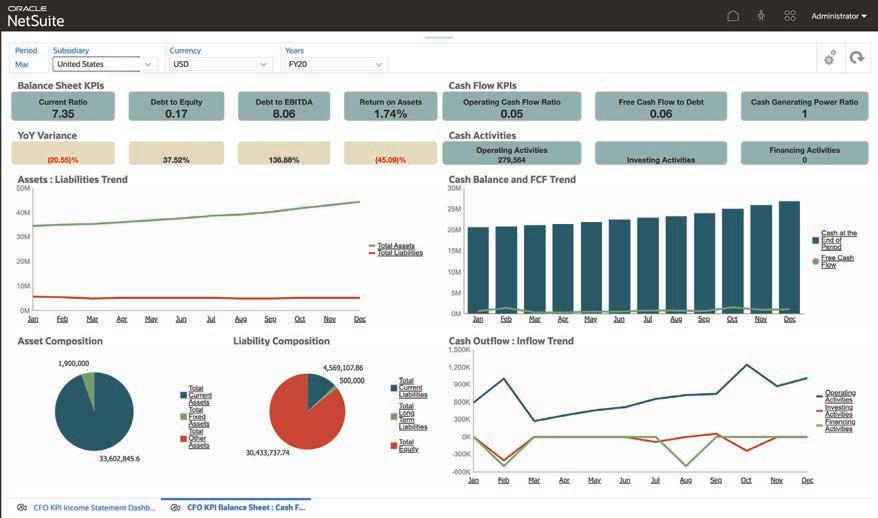



















 By Mark Sanchez
By Mark Sanchez












































 By Kate Carlson
By Kate Carlson


















 LINDA APSEY President and CEO ITC Holdings Corp
LINDA APSEY President and CEO ITC Holdings Corp
 Senior Vice President and Chief Business Officer ITC Holdings Corp
Senior Vice President and Chief Business Officer ITC Holdings Corp


































































 Jason Nickel, Senior Vice President
Jason Nickel, Senior Vice President


































































